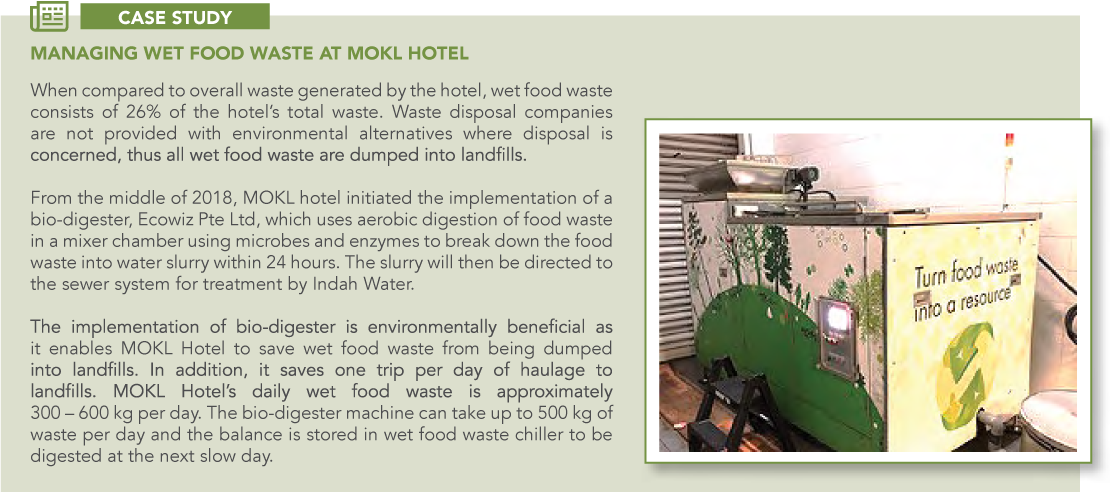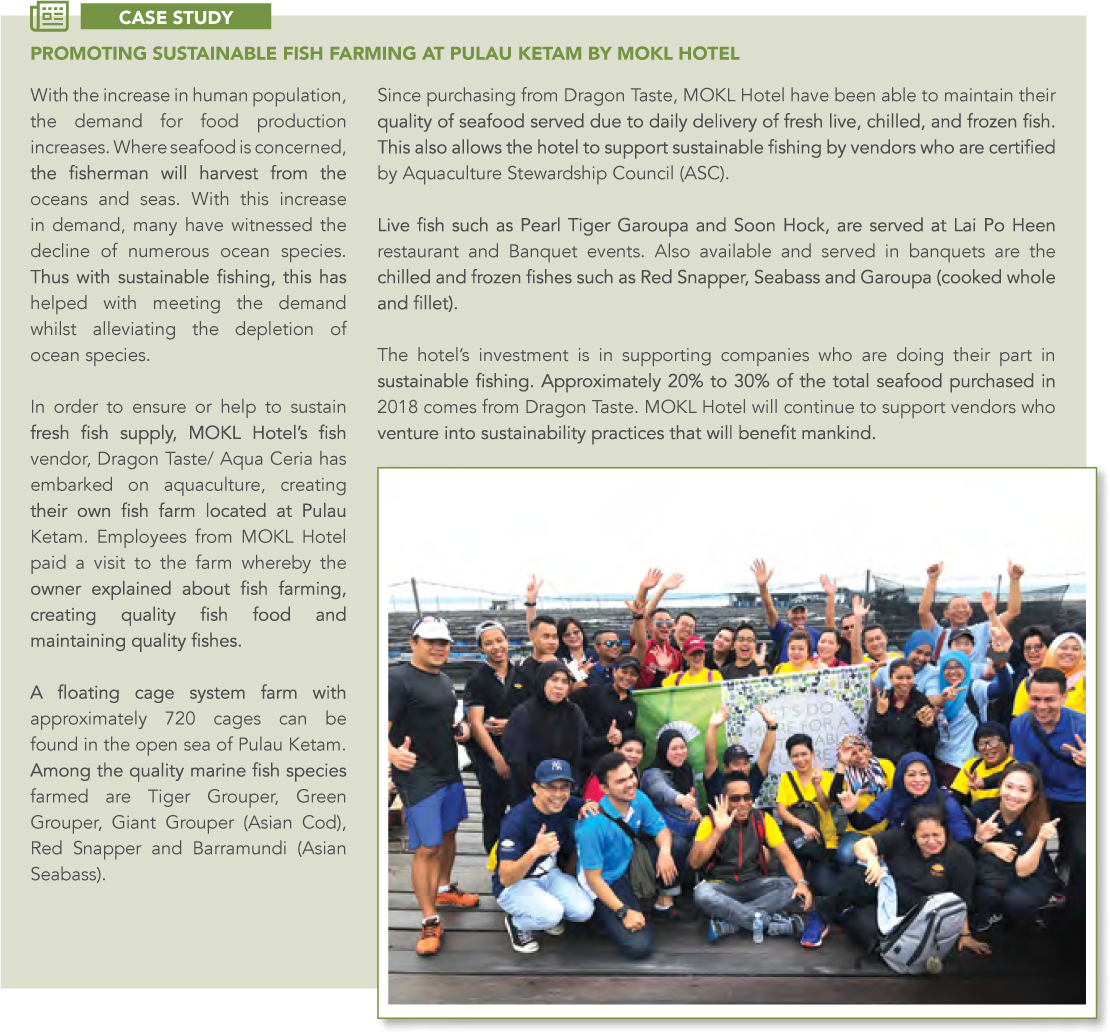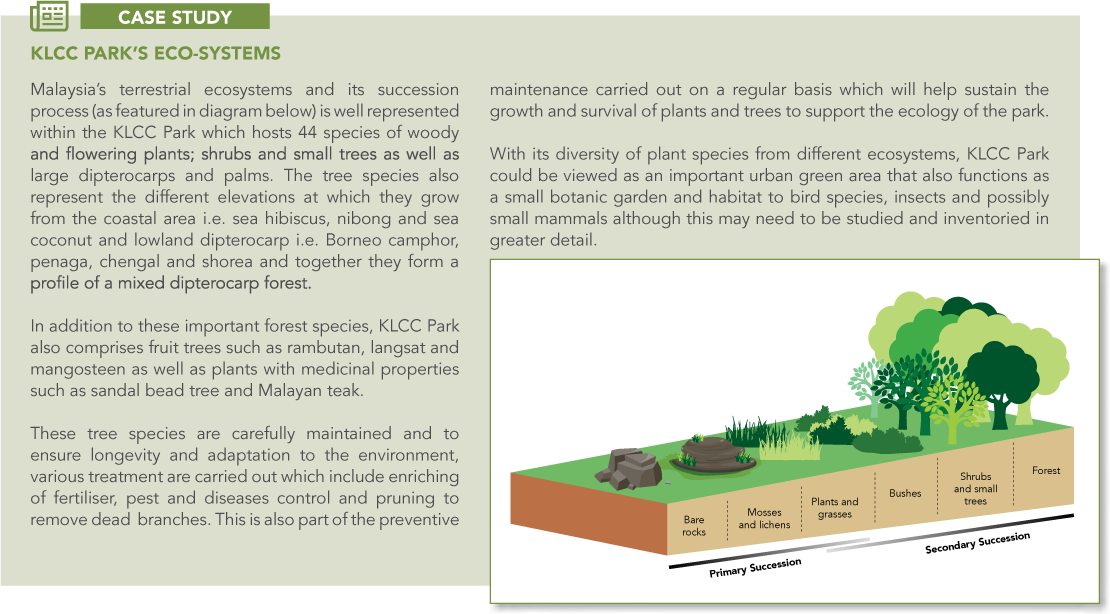Planet
Material Sustainability Matters:
Climate Change and Energy Management
Environmental Management – Water and Waste Management
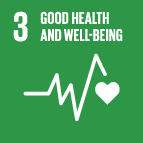
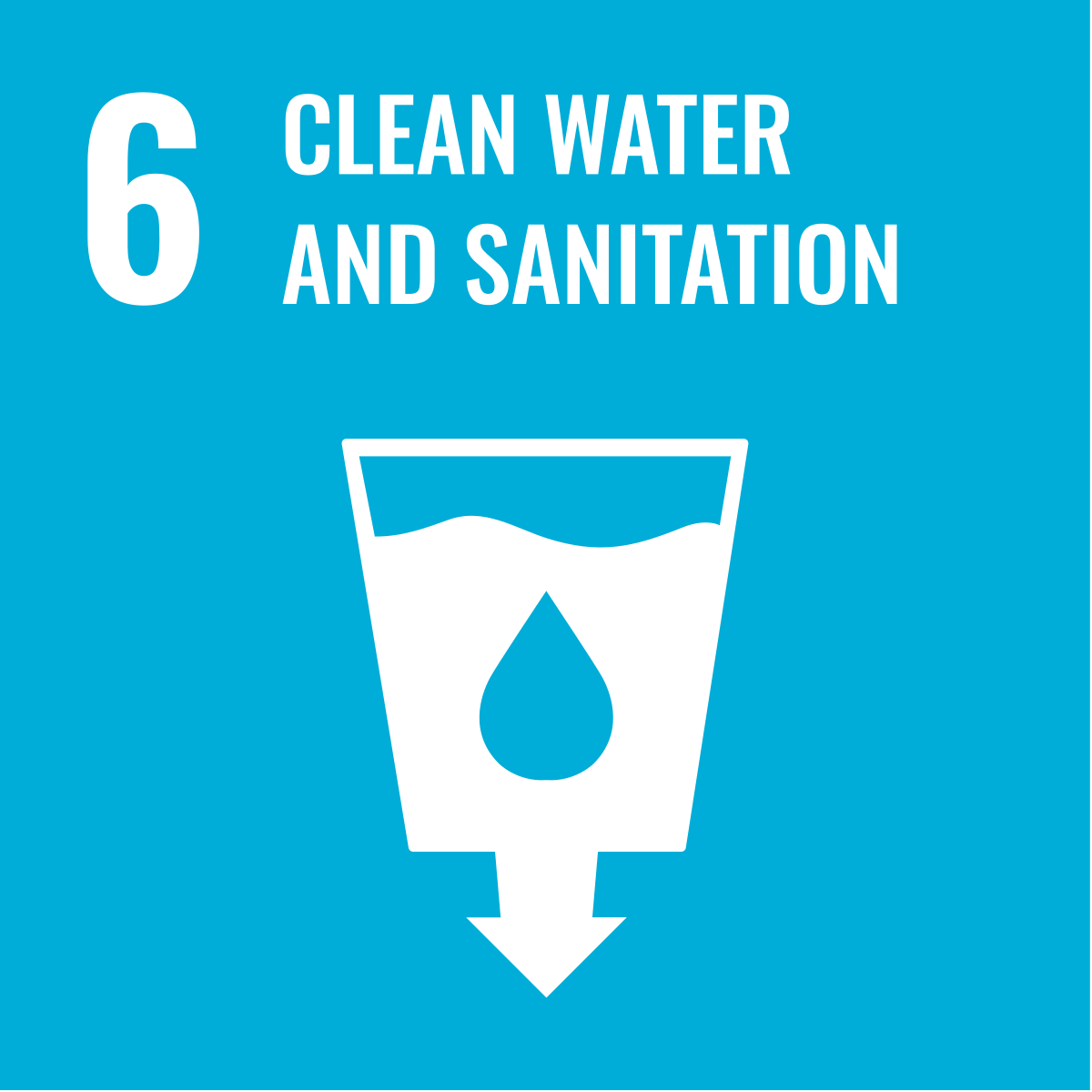
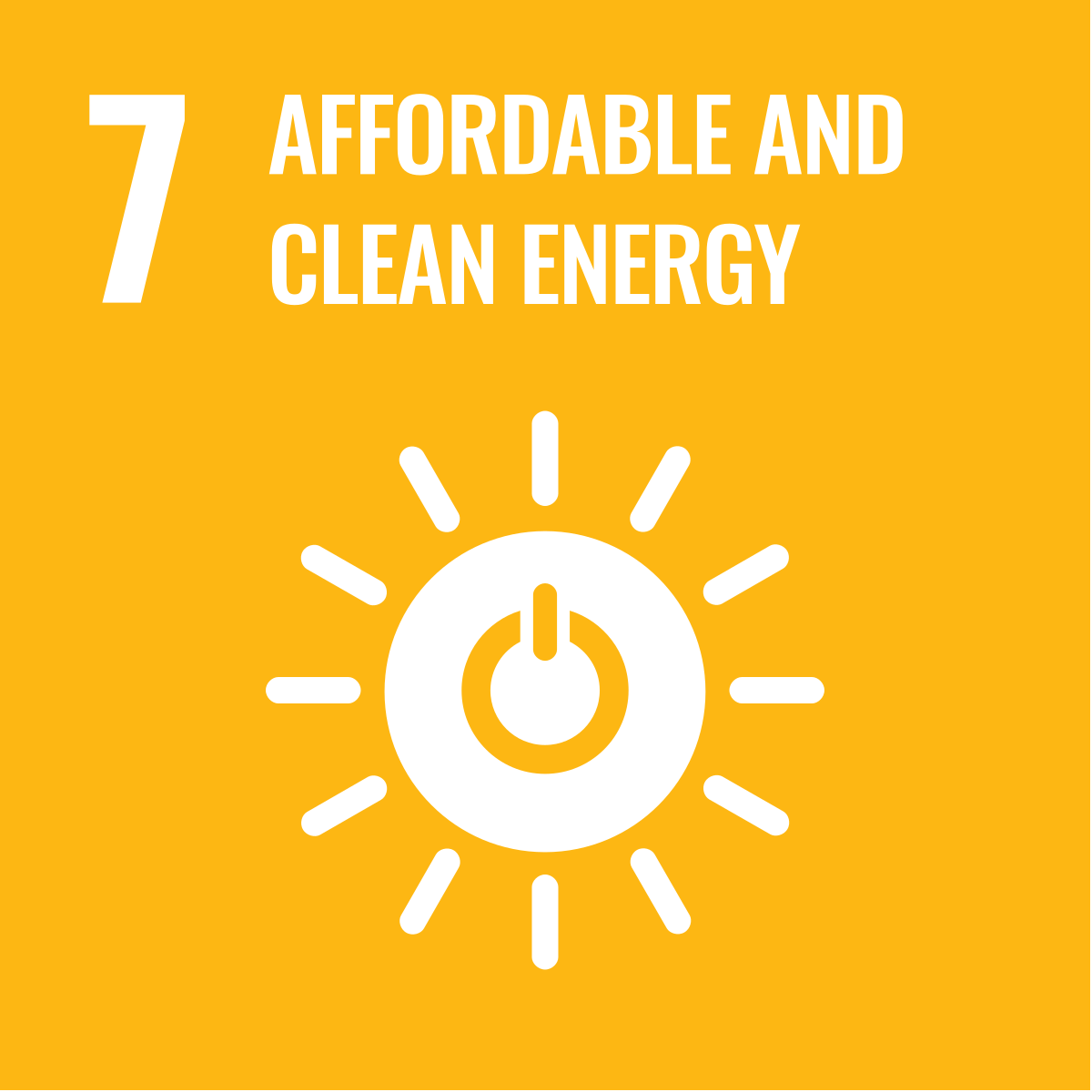
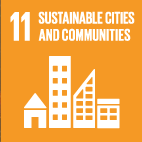
Safeguard The Environment
Driving sustainability through climate action and responsible energy, water and waste management for a better future.Our Commitment
At KLCCP Stapled Group, we recognise the interconnectedness of climate change, energy management and environmental stewardship in building a sustainable future. The growing impacts of climate change, such as floods, heat waves and droughts, threaten both communities and the resilience of our assets. Similarly, environmental degradation, including resource overuse and improper waste management, underscores the need for urgent action.
We are committed to reducing our carbon footprint through energy efficiency and decarbonisation efforts, while embracing eco-friendly practices that position our properties as symbols of modernity and responsibility. By engaging tenants, partners and surrounding communities, we strive to foster shared accountability for protecting the planet. Our environmental and climate management strategy reflects a steadfast dedication to creating sustainable value for future generations.
Our Approach
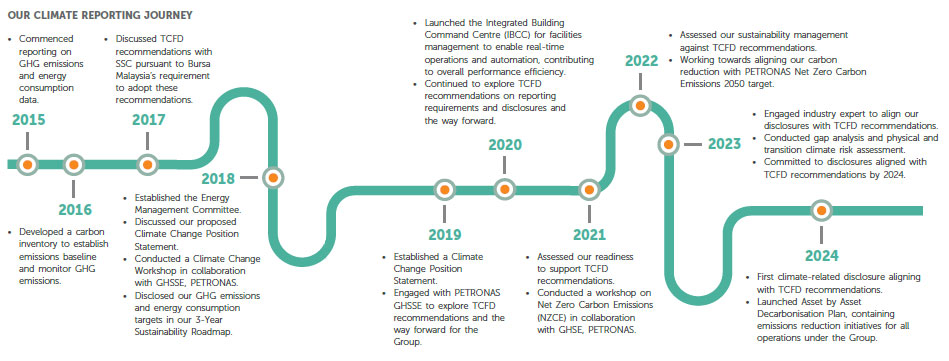
CLIMATE-RELATED DISCLOSURE
In September 2022, Bursa Malaysia revised the Main Market Listing Requirement to elevate the sustainability practices and disclosures (Enhanced Sustainability Disclosure) of listed entities. Their practice note requires climate-related disclosures to be prepared and aligned with TCFD recommendations by the financial year ending 31 December 2025 onwards. As a public limited company on the Main Market of Bursa Malaysia Securities Berhad, KLCCP Stapled Group, encompassing KLCCP and KLCC REIT Management Sdn Bhd (KLCCRM), is obligated to disclose common sustainability matters in our 2024 documents, and gradually move towards TCFD-aligned climate disclosures for the financial year ending (FYE) on or after 31 December 2025. To satisfy this requirement, as well as to meet stakeholders’ expectations for transparent climate disclosures, KLCCP Stapled Group conducted a materiality assessment, where Climate Change and Energy Management are ranked as priority environmental, social and governance (ESG) topics with high materiality for KLCCP Stapled Group’s ESG Strategy.
KLCCP Stapled Group recognises the urgency of addressing climate change and its impacts on the company’s financial performance through relevant action, as well as on reporting on our initiatives in line with Bursa Malaysia’s requirement for mandatory TCFD disclosures. Initiatives undertaken in this regard are therefore recorded in this document, including support provided of an external consultant to assess and address climate-related risks and opportunities.
A comprehensive gap analysis conducted in 2023 identified areas for improvement in our climate risk management and disclosures based on TCFD recommendations as well as industry/market good practices. These gaps were subsequently addressed via measures including:
- Scenario analysis on transition and physical risks and opportunities and their financial implications on the Group’s business and value chain
- Identification of possible risk mitigation and adaptation actions
- Enhancement of existing governance, strategy and risk management systems to incorporate climate-related considerations
- Capacity building of management team on financial impacts of climate risks and their respective roles and responsibilities in climate governance structure
In September 2024, the Securities Commission announced the National Sustainability Reporting Framework (NSRF), requiring Main Market listed companies with market capitalisations of more than RM2 billion to disclose in accordance with IFRS S1 and S2 starting in 2025, with full adoption of the standards by 2027. Bursa Malaysia had also revised it’s Main Market Listing Requirements in December 2024, with the requirement to align with TCFD recommendations disapplied and substituted with IFRS S1 and S2. KLCCP Stapled Group, while maintaining the alignment with TCFD recommendations in our climaterelated disclosure for the year under review, will pursue IFRS S1 and S2 disclosures in phases, considering the reliefs allowed within the NSRF, and leveraging the data as well as systems put in place from earlier preparations made for TCFD.
This first climate-related disclosure summarises the Group’s climate-related risks and opportunities and the integration of the financial risks and opportunities into corporate governance, strategy, risk management, metrics and targets.
The disclosure of financial information allows all parties to understand the potential financial consequences of climate change to the reporting company, its investors and other stakeholders. TCFD’s disclosure framework, conceptually similar to IFRS S2, comprises four pillars: Governance, Strategy, Risk Management, and Metrics and Targets as shown below. Collectively, the pillars provide insights into the reporting company’s management and resilience strategy against climate-related financial impacts.
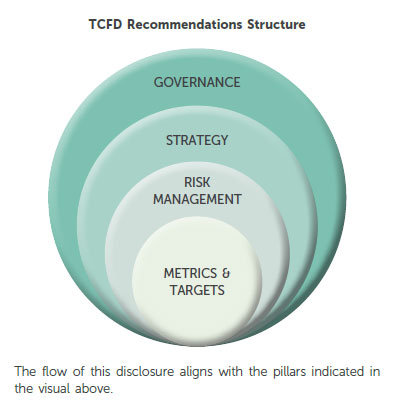
Governance
KLCCP Stapled Group’s commitment to sustainability and climate-related matters is firmly rooted in our robust governance structure, which sets the governing elements and processes as the foundation of sustainability integration. Decision-making processes take into consideration sustainability risks, including overarching risks to the delivery of NZCE by 2050. Efficient governance serves to provide a common understanding and consistent approach in managing related risks and opportunities stemming from climate change.
Climate risk and opportunities are also included in the ESG training plan which is explained in detail on page 76 for different functions. In 2024, one training session was conducted on 14 December 2023 by an external consultant as part of the climate risk assessment.
The results of our climate risks and opportunities assessment, along with the narrative statement within this report, were also presented to the top management of the Group during an executive presentation on 16 April 2024.
Strategy
The effects of climate change are increasingly evident in the frequency and severity of climate-related events such as floods, typhoons, heatwaves, forest fires and droughts, among others. These have a pronounced negative impact on business and communities, often damaging assets and disrupting business activities. At the same time, the transition to a lowcarbon economy poses its own risks and opportunities, where transition ahead of other companies presents business opportunities, whereas falling behind may result in financial and reputational impacts.
For the Group, climate change may pose a risk to our assets, surrounding communities and overall business model and value chain. Accordingly, we strive to enhance the durability of our assets to build resilience and even seize opportunities arising from the low-carbon economy transition, where possible.
Guided by the SSC, each of our operating units conducted physical and transition climate risks and opportunities assessments. The physical risk assessment used Shared Socioeconomic Pathways (SSP) scenarios from the Intergovernmental Panel on Climate Change (IPCC)1, while the transition risks and opportunities assessment was based on the International Energy Agency (IEA)’s Stated Policies Scenario (STEPS) and Announced Pledges Scenario (APS).
The Group has identified the following timeframes for physical and transition risks and opportunities assessment: short-tomedium term (1-10 years) and long-term (>10 years). The timeframes are intended to reflect potential climate impacts on the Group’s assets in their useful lifetime – an average of 50 to 60 years.
Assessment Scope
We conducted a physical risk assessment on eight assets, examining a list of nine potential climate hazards utilising the Low Carbon Scenario (SSP1-2.6) and High Carbon Scenario (SSP5-8.5). Based on relevant climate hazards applicable to the scope of assessment, five hazards were shortlisted with highest risk scores across short-to-medium term and longterm horizons for further assessment.
Physical Risk Assessment Scope
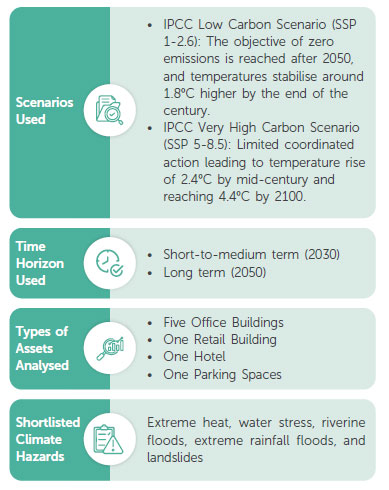
Assessment Approach
Acknowledging that physical climate change risks can have implications on our assets, KLCCP Stapled Group prioritised 8 assets in Klang Valley to conduct a climate risk assessment using a three-step qualitative physical risk assessment approach.
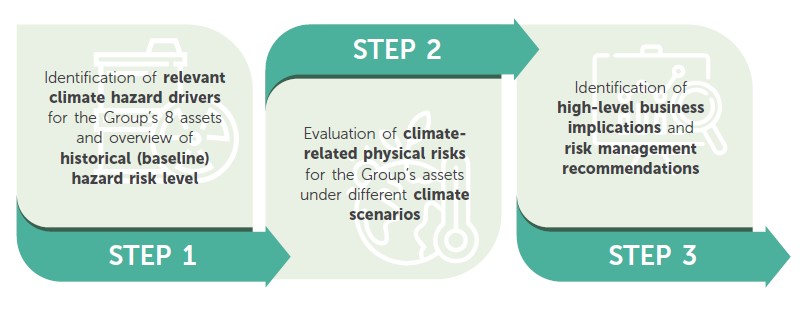
Physical Climate Risk Identified
For the physical risk assessment, the Group identified five main natural hazards that could impact our assets, including both acute (event-driven) and chronic (long-term shifts in climate patterns) hazards as identified below. These natural hazards pose risks of varying severity to our assets and, therefore, our businesses.
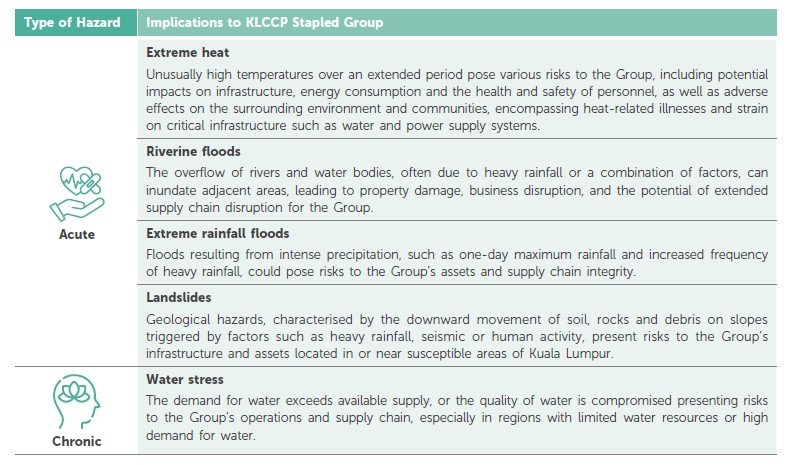
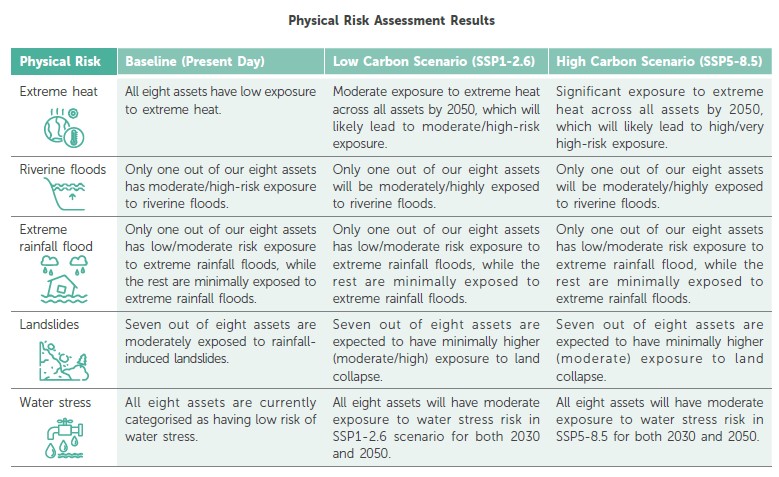
Potential Impacts on KLCCP Stapled Group Assets
Our assets will experience similar climate-related impacts as they are all situated close to each other. The table below shows the impacts by type of hazard on the Group’s operations, value chain and health, safety and environment (HSE).
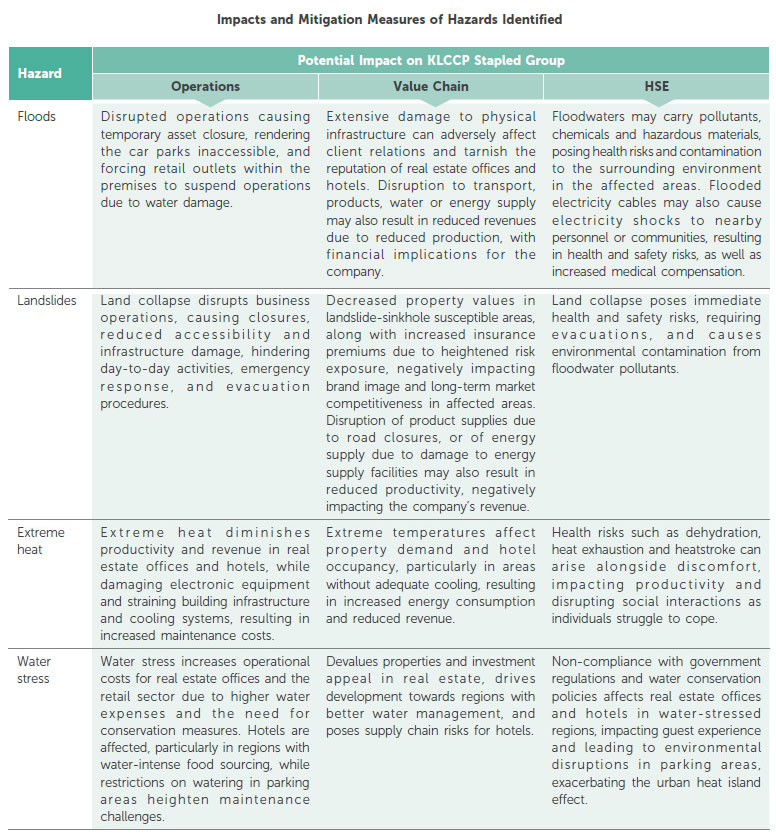
TRANSITION RISKS AND OPPORTUNITIES
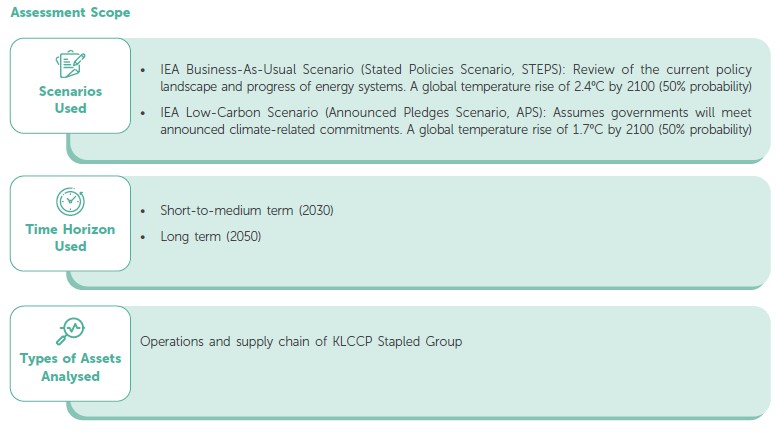
Assessment Approach
The scenario analysis on transition risks and opportunities was intended to comprehensively analyse the Group’s exposure to potential impacts arising from a global transition to a low-carbon economy i.e., an economy that is decarbonising. The transition risk and opportunity assessment was a three-step qualitative process as indicated in the visual below.
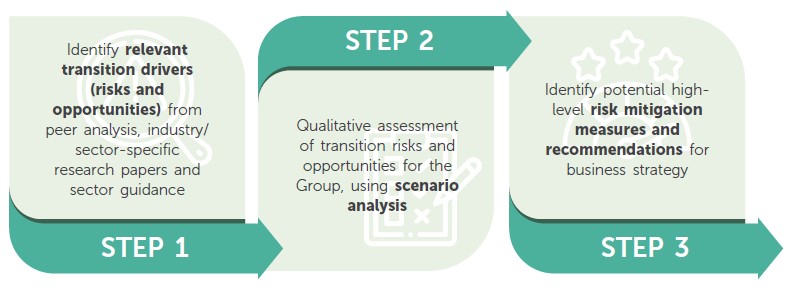
Transition Risk Assessment Approach
TCFD recommends that organisations disclose the resilience of their business strategies to climate-related risks and opportunities, taking into consideration a transition to a lower-carbon economy, where the low-carbon economy pathway is consistent with a 2°C or lower increase in temperature by the end of the century, compared with pre-industrial levels. This could lead to transition risks associated with increased operating costs due to more stringent laws and regulations on GHG reduction, and higher demand for low-carbon technology investment.
The Group sought to ensure that both upstream risks, such as carbon tax on suppliers, and downstream opportunities, such as cost savings from energy efficiency or renewable energy, were included in the analysis to ensure a holistic understanding of the transition risks and opportunities.
An internal stakeholder consultation was conducted through a survey to support the assessment. The transition drivers were evaluated by stakeholders on the impact of the respective drivers on the Group’s businesses and value chain.
The Group has analysed the potential impacts on our business using globally recognised climate scenarios from the IEA – APS as a low-carbon scenario, and STEPS as the business-as-usual case.
Transition Risk and Opportunity Scoring for Assessment

Transition Drivers Identified
The Group has identified a list of transition risks and opportunities that are considered relevant and used in scenario analysis.
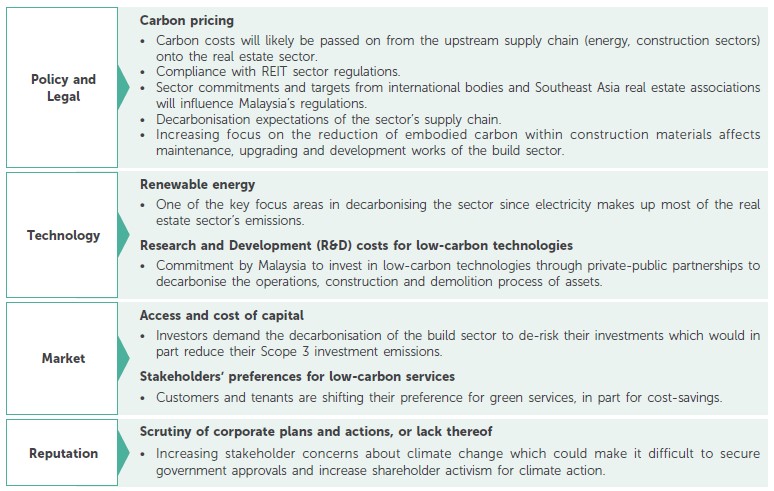
Transition Scenario Analysis Results and Impacts on KLCCP Stapled Group Assets
The scenario analysis on transition risks and opportunities aimed to assess the Group’s exposure to potential impacts stemming from a global shift towards a low-carbon economy. Through internal stakeholder consultations, The Group initially identified transition drivers relevant to our operations and the supply chain.
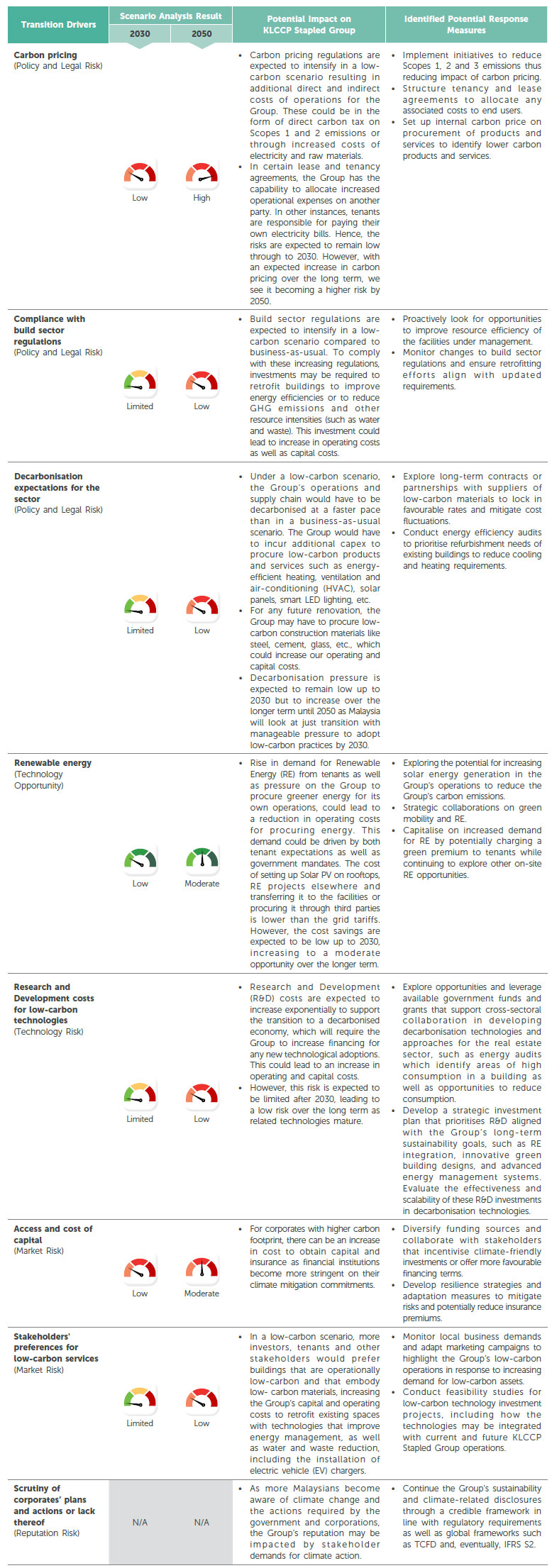
RISK MANAGEMENT
Risk management forms an integral part of KLCCP Stapled Group’s business and supports the delivery of our strategy while underpinning the Group’s business model. Our risk management policy and procedures are designed to embrace best practices, reduce the potential of financial and nonfinancial risk exposure (including exposure to climate change risk), and protect our assets and reputation.
The Boards provide direction by establishing sound risk management principles, guided by the KLCC Group Enterprise Risk Management (ERM) Framework which outlines our risk governance, risk assessment as well as risk monitoring and review processes. This framework provides a standard and consistent approach to achieve full accountability in managing risks across the organisation.
For more information on the KLCC Group’s ERM processes, please refer to the Statement on Risk Management and Internal Control in the Integrated Report 2024 on pages 223 to 226.
The KLCC Resiliency Model below provides an integrated view of the overall risk management strategy in KLCC (including climate change risk), which is to reduce the likelihood and impact of all identified risks, respond to immediate risk, and recover from prolonged disruptions to meet business obligations. For more information on the KLCC Resiliency Model, please refer to the Statement on Risk Management and Internal Control in the Integrated Report 2024 on pages 223 to 226.
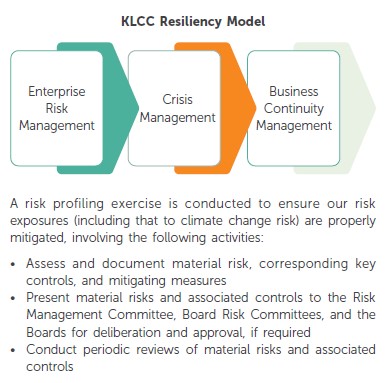
METRICS AND TARGETS
Climate-Related Metrics
The Group is determined to act on climate change to support the needs of the present and future generations while protecting our business. As a first step, it is important to establish measurable climate-related metrics for performancetracking purposes and set measurable targets to ensure improvements in efforts to tackle climate change.
With regards to climate-related metrics, the following percentage of assets covered by the physical risk assessment will be exposed to increasing risk from different hazards under future climate scenarios compared with the baseline:
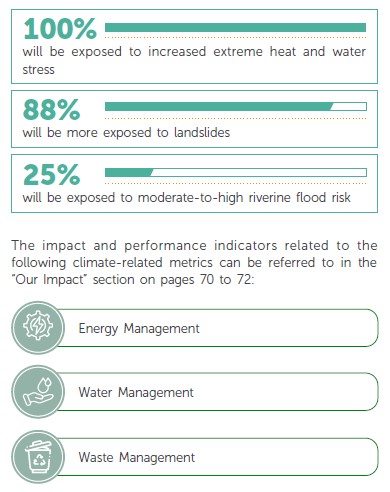
GHG Emissions metrics
In FY2024, KLCCP Stapled Group calculated our GHG emissions in accordance with “The Greenhouse Gas Protocol - A Corporate Accounting and Reporting Standard (Revised Edition)”. We report our GHG emissions using the Equity Share approach, which is based on organisational boundaries.
The Group monitors emissions from all our assets and operating units, covering the following (the information below can be converted to visual representation):
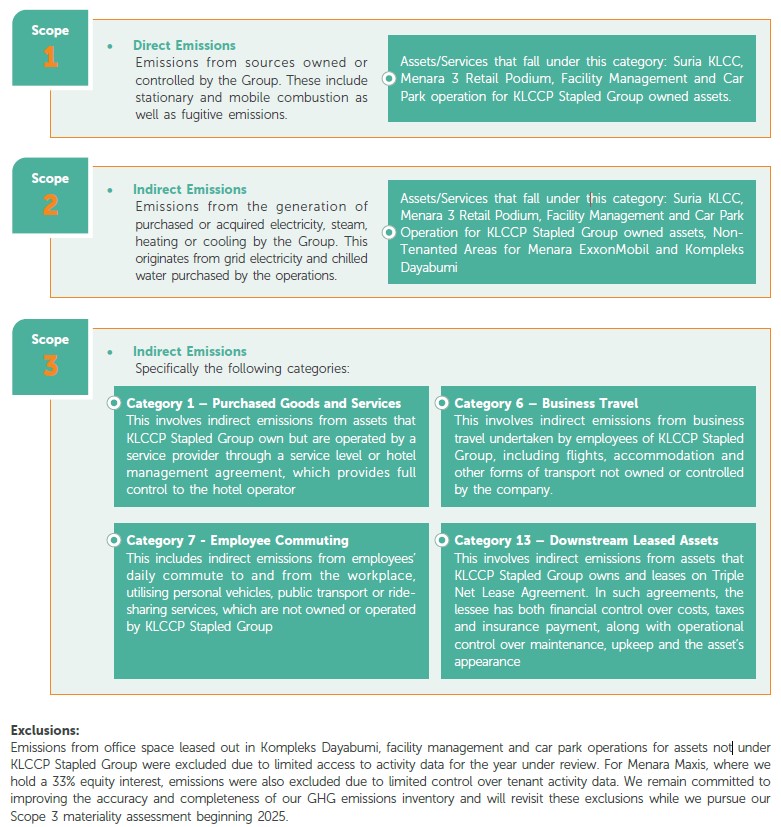
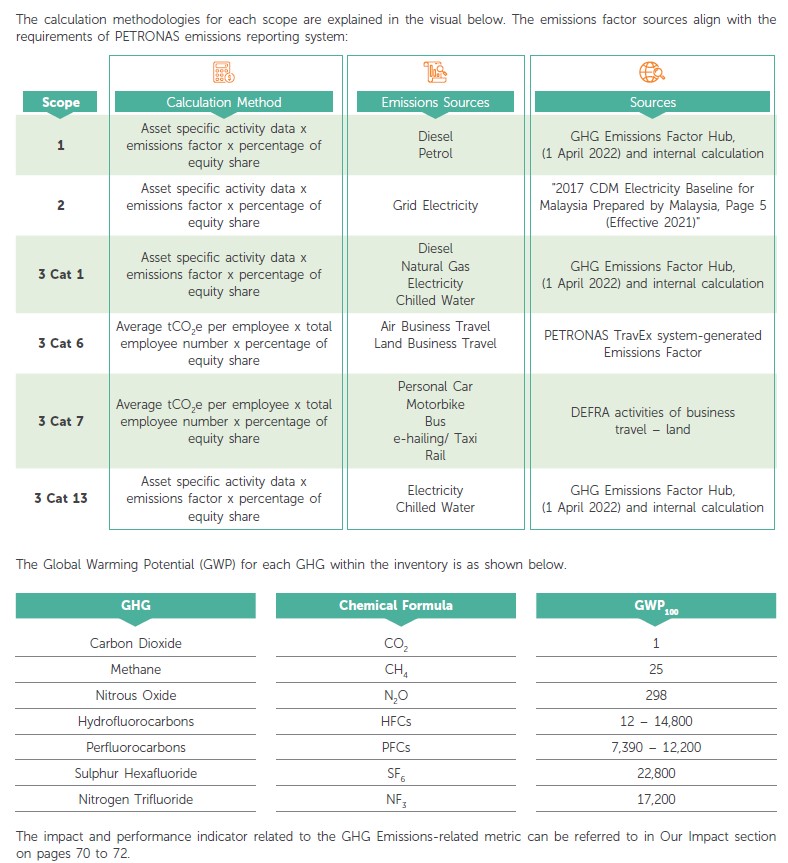
GHG Emissions and Other Targets
KLCCP Stapled Group is guided by our Sustainability Plan 2030 as well as Net Zero Carbon Emissions Pathway 2050 in defining our climate-related targets. The Group’s climate-related targets are as follows:
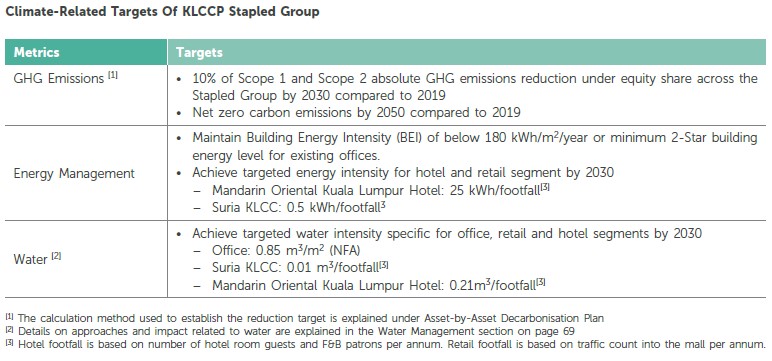
Asset by Asset Decarbonisation Plan
In 2024, all business segments undertook a thorough review to identify initiatives for decarbonisation. The potential reduction from these initiatives were calculated and compared with forecasted emissions up to 2030, providing bottom-up information on percentage of reduction possible across the Group based on the following formula:
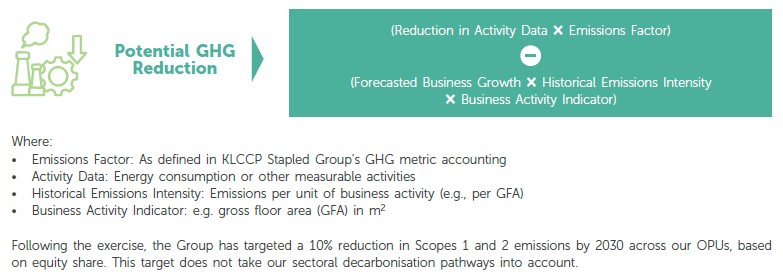
Energy Management
Energy management remains a critical focus for the Group as we navigate evolving market dynamics in Malaysia. By integrating energy-efficient practices, we achieve cost savings while advancing environmental sustainability, aligning with global efforts to combat climate change.
PETRONAS Twin Towers (GBI Gold), Menara 3 Petronas (GBI Silver) and Menara Maxis (Silver) serve as benchmarks for our commitment to green building standards. These certifications, representing 60% of our office portfolio, reflect ongoing efforts to embed sustainability within our built environment.
Our energy management approach prioritises reducing consumption through operational efficiency and technological innovation. Initiatives such as retrofitting facilities with energy-saving technologies have consistently improved energy performance.
Energy intensity is one of our goals under the Planet pillar of our Sustainability Plan 2030, with specific targets set for each segment.
Looking ahead, in compliance with the new Energy Efficiency and Conservation Act 2024, we will explore ways to maximise our efficiency as well as reduce our consumption through initiatives such as adopting RE. Our aim is to support Malaysia’s carbon reduction objectives and reinforce our role as a leader in sustainable property management. This commitment underscores our dedication to a lower-carbon future and resilient energy management practices.
Key initiatives for Decarbonisation and Energy Management based on business segments in 2024:
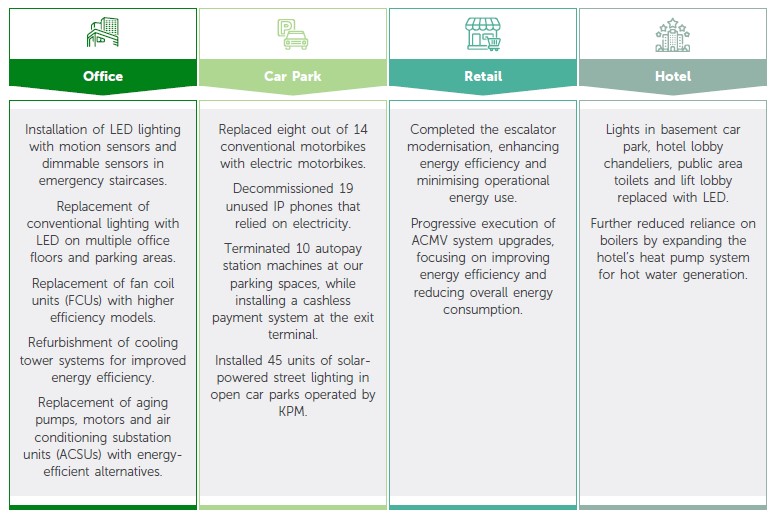
Water Management
Water consumed across our office buildings, retail malls and hotel facilities is sourced or withdrawn entirely from municipal water supplies with no use of surface or groundwater. All discharged water from our facilities flows into municipal sewerage systems and is subsequently treated by public sewage treatment plants (STPs) in compliance with local regulations. As such, there are no specific effluent quality requirements applicable to our organisation.
As part of our HSE policy, we are committed to the responsible use of resources and continuously strive to enhance water efficiency in our operations. Our environmental impact assessment includes resource use evaluations, ensuring potential risks related to water consumption are identified and mitigated.
Additionally, all operations are evaluated to ensure they do not contribute to water wastage. This includes the installation of water-efficient systems, the promotion of non-wasteful behaviours among stakeholders, and appropriate controls to manage water discharge impacts. For instance, MOKUL Hotel modernised their public washrooms with water-saving sensor faucets and bidets, which reduces wastage, while improving hygiene and comfort. While water recycling has not been implemented yet, we remain committed to exploring innovative solutions to minimise water withdrawal and discharge.
Waste Management
Waste is categorised as hazardous or non-hazardous, adhering to the Environmental Quality Act 1974 and the Solid Waste and Public Cleansing Management Act 2007.
Hazardous Waste
We comply strictly with Environmental Quality (Scheduled Waste) Regulations 2005 to manage hazardous waste from generation to final disposal. Our practices include:
- Storing scheduled waste securely in appropriate containers to prevent spillage or leakage, ensuring containers always remain closed.
- Leveraging the Electronic Scheduled Waste Information System (eSWIS) developed by the Department of Environment (DoE) for lifecycle monitoring of waste from cradle to grave.
- Prioritising waste minimisation through reuse, recycling and recovery initiatives before disposal.
- Ensuring compliant disposal practices through licensed contractors.
- Appointing Competent Persons to oversee hazardous waste management at each facility.
- Conducting routine inspections and assessments, including weekly Scheduled Waste Storage Inspections, quarterly Functional Assessments, and annual Operating Legal Assessment reviews.
- Promptly addressing non-compliance issues and sharing lessons learned to prevent recurrence.
Non-Hazardous Waste
Our management of non-hazardous waste aligns with sustainability principles, with a focus on reducing waste generation and promoting responsible disposal. Key initiatives include:
- Monitoring non-hazardous waste inventory at the building level using an internal tracking system.
- Supporting the Malaysia Towards Zero Single-Use Plastic (SUP) Roadmap 2018-2030 by eliminating SUPs during company meetings and events.
- Providing waste segregation bins in all office spaces and training cleaning staff on effective waste segregation.
- Ensuring responsible non-hazardous waste disposal by appointing licensed transporters.
These efforts reflect our holistic approach to environmental stewardship, emphasising compliance, innovation and collaboration for sustainable outcomes.
Efforts towards supporting circularity
Reverse Vending Machine
KLCCP Stapled Group, in collaboration with MISC and Janz Technologies, has installed a Reverse Vending Machine (RVM) in the Kompleks Dayabumi vicinity. The aim is to drive behavioural change in our employees towards recycling through education and incentives as well as recover as many plastic bottles and cans as possible, diverting them from landfills and oceans to minimise plastic pollution. This initiative aligns with the KLCCP Sustainability Agenda and the UNSDG, supporting UNSDG 11: Sustainable Cities and Communities, and UNSDG 12: Sustainable Consumption and Production.
This initiative aligns with the KLCCP Sustainability Agenda and the UNSDG, supporting UNSDG 11: Sustainable Cities and Communities, and UNSDG 12: Sustainable Consumption and Production.
Fabric Recycling
Another collaboration between KLCCP Stapled Group, MISC and Pos Malaysia involves the installation of a fabric recycling bin in 2023. In 2024, 1033.8 kg of fabric was collected, demonstrating the programme’s effectiveness in:
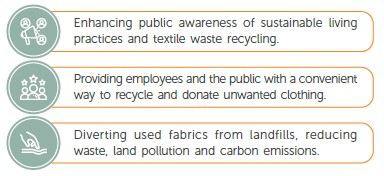
Food Waste Digester
MOKUL Hotel utilises advanced food waste digestion technology, specifically the MAEKO LQ Series system, to manage organic waste sustainably. This system processes food waste on-site, converting it into liquid that is safely discharged into the drain and routed to the sewage treatment plant (STP). Using this system, we eliminate the need for waste bins and reduce the volume of waste sent to landfills, lowering our waste management costs and minimising methane emissions. This aligns with efforts to integrate sustainable practices into daily operations while supporting circularity by ensuring food waste is treated responsibly and reintroduced into the water cycle through the STP.
Our Impact
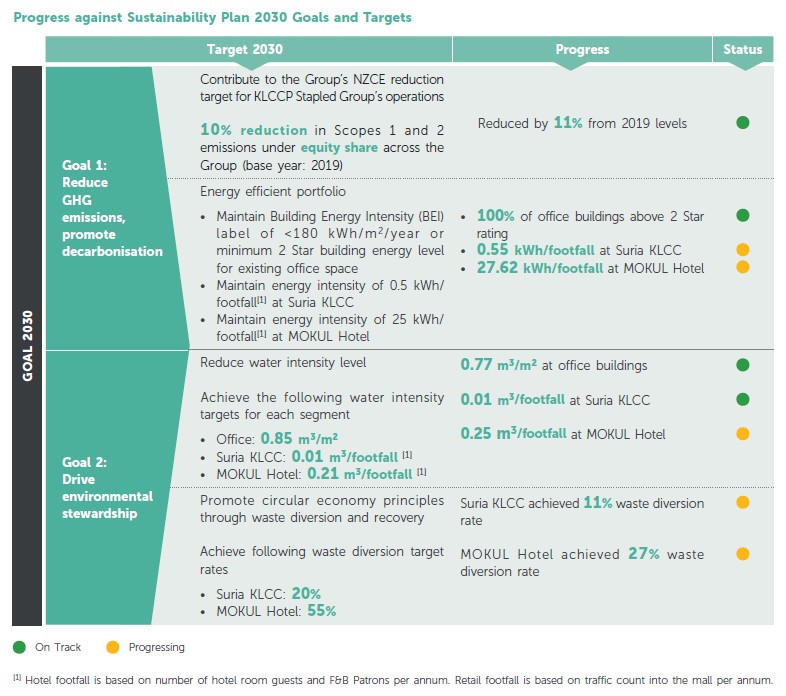
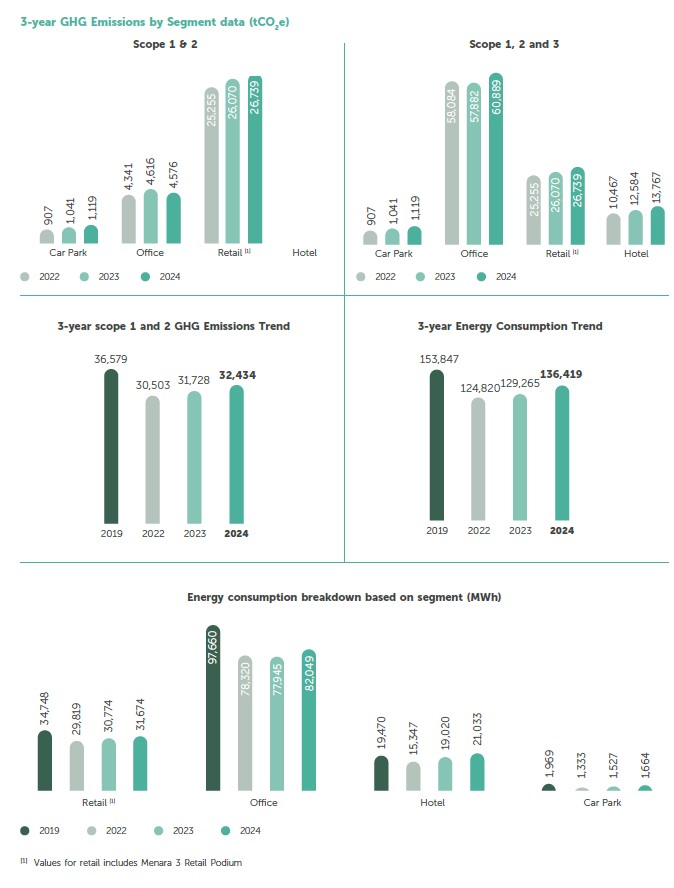
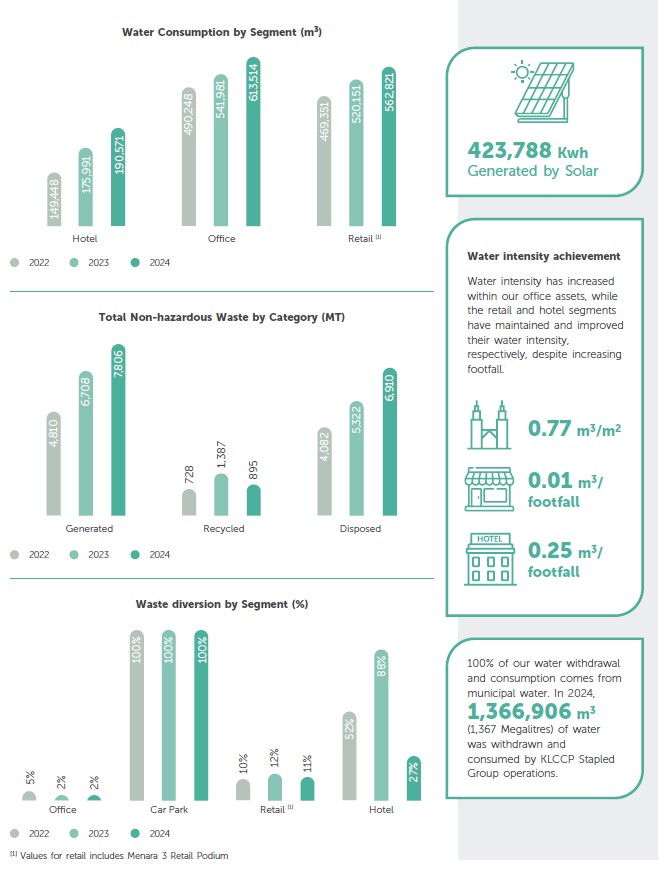
Our Outlook
Looking ahead, we aim to elevate our climate and environmental performance by aligning with national and international frameworks such as the National Sustainability Reporting Framework, especially on IFRS S2. We will ensure readiness to meet the requirements of the Energy Efficiency and Conservation Act (EECA) 2024. We are also working towards greater transparency in our climate-related disclosure, refining our Scope 3 emissions inventory through materiality assessments, and implementing decarbonisation measures across our operations.
In tandem, we will advance circular economy principles by optimising resource use, reducing waste, and embracing innovative technologies to promote recycling and landfill diversion. Strategic partnerships will enable us to embed sustainability into every segment of our operations, driving resource efficiency and long-term environmental stewardship. Together, these efforts position us to achieve our Net Zero Carbon Emissions Pathway 2050 and contribute meaningfully to a more sustainable future for all.

Prosperity
Material Sustainability Matters:
Financial Sustainability
Supply Chain Management
Customer and Tenant Management
Corporate Social Responsibility
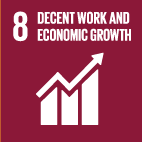

Continued Value Creation
Driving financial sustainability, strengthening supply chain and tenant relationships, and advancing customer engagement and corporate social responsibility to deliver enduring value.Our Commitment
KLCCP Stapled Group is dedicated to achieving financial sustainability through strategic investments, operational excellence, and the integration of ESG principles across our operations. This approach ensures long-term value creation and positions us as a resilient and responsible organisation.
We actively foster positive social impact through a sustainable supply chain by partnering with suppliers who share our commitment to ethical standards, diversity and fair labour practices. This strengthens both our operational efficiency and community outcomes, reinforcing our reputation for excellence.
Our focus on building strong relationships with customers and tenants drives trust, brand loyalty and positive social impact, contributing to vibrant, inclusive communities. We are committed to enhancing well-being through community initiatives that support local infrastructure, education and healthcare, further cementing our role as a responsible corporate citizen.
Our Approach
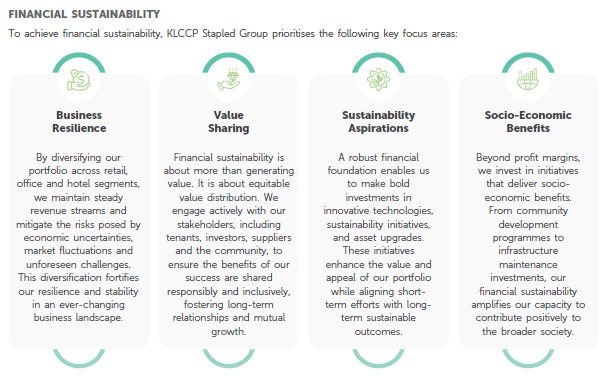
TAX GOVERNANCE, APPROACH AND RISK MANAGEMENT
The Group maintains a robust tax governance and control framework to ensure compliance with our tax strategy. Oversight is provided by various governance bodies and executive-level positions, with the Group Chief Financial Officer (CFO) serving as the highest authority for tax-related strategies, while regular compliance activities are managed and reviewed by the Financial Controller. The adoption of key tax policies is formally approved by the Board.
We assess tax financial risks annually, identifying areas of concern and addressing them through appropriate management actions. Additionally, a self-assurance process is conducted using myAssurance, a compliance checklist designed to ensure adherence to tax regulations. This process is supported by robust records management practices, ensuring all relevant documents are properly maintained.
The tax department plays a central role in embedding tax considerations across the Group. Businesses consult the tax team for new initiatives to enable assessment of potential risks and identify opportunities for incentives and reliefs. Collaborative efforts between Strategic Finance, Group Risk and Assurance, and Digital divisions further strengthen the integration of tax governance within the Group.
Risks related to tax are identified, managed and monitored through systematic assessments and ongoing compliance measures. Compliance with the tax governance and control framework is evaluated regularly through internal reviews and audits.
To uphold integrity and ensure transparency, the Group has established whistleblowing channels through various methods, enabling employees and stakeholders to raise concerns about business conduct and tax-related matters.
While the Group’s tax strategy currently lacks a direct link to its business and sustainable development strategies, we are actively exploring opportunities to incorporate UNSDG into our financial strategies. This approach will further enhance our ability to make strategic investments in sustainability while maintaining strong governance and compliance practices.
SUPPLY CHAIN MANAGEMENT
Our approach to supply chain management transcends operational efficiency; it embodies our commitment to sustainability and ethical practices, ensuring our values resonate across all business relationships.
- Sustainable Supply Chain and Ethical Behaviour
We recognise our influence in shaping suppliers’ practices and have embedded sustainability into every aspect of our supply chain management. Through robust procurement management, we mandate adherence to our CoBE in all contracts with contractors, consultants and suppliers, prioritising anti-corruption measures, business ethics and HSE practices. - Supplier's Code of Conduct
Our suppliers are held to high ethical and sustainability standards through a comprehensive code of conduct. Beyond compliance, we aim to foster a ripple effect of positive change, encouraging suppliers to adopt similar values and practices within their own networks. - Supplier Diversity and Local Procurement
We are committed to promoting diversity within our supply chain and supporting the local economy. By prioritising local suppliers wherever feasible, we contribute to socioeconomic growth while ensuring alignment with our sustainability goals. - Supplier Audits
To ensure compliance with our ethical and sustainability standards, we conduct regular audits of our suppliers. These audits enable us to identify areas for improvement and collaborate with suppliers to enhance their performance, reinforcing the integrity of our supply chain. - Purchasing Policy and Scope
Our purchasing policies are guided by sustainability and responsibility, covering the entire scope of procurement activities. We ensure that all purchasing decisions align with our broader goals of operational excellence and ethical behaviour. - Green Procurement
For our hotel segment, in line with the Group’s sustainability aspirations, we actively promote green procurement practices. By sourcing environmentally friendly materials and engaging with suppliers who prioritise sustainable production methods, we reduce our environmental footprint and drive innovation in our supply chain. Through these initiatives, KLCCP Stapled Group’s supply chain management not only supports operational efficiency but also strengthens our commitment to ethical practices, sustainability and local economic development.
There have also been several improvements made in terms of processes involved in procurement, especially on the automation front:
- Consolidated Procurement: Consolidation of procurement activities minimise redundant tasks, enabling employees to focus on high-value initiatives and enhancing overall productivity.
- SMART by GEP Implementation: The SMART by GEP system as an end-to-end digital procurement platform supports our sustainability goals by digitising procurement processes, significantly reducing paper usage and fostering a more sustainable and efficient approach to purchasing.
- Digital Tools for Procurement: The Group developed and implemented digital tools for procurement that are designed to eliminate waste. By digitising workflows and centralising data, we reduce inefficiencies, foster a dynamic work environment and contribute to sustainability by minimising resource consumption.
- Commitment to ESG in Supply Chain Management: We are gearing towards improving our supply chain management to embed elements of ESG as part of our commitment for sustainability. Further details can be found in Our Outlook section on pages 104 to 105.
Additionally, human rights requirements on supply chain have been strengthened by the establishment of the Human Rights Policy across each entity in the Group. In 2024, the Group began fine-tuning the relevant mechanism and procedures to ensure adherence to principles in the policy. These will be finalised in 2025.
Demonstrating a commitment to sustainability, a total of RM6.61 million was invested in responsible procurement by MOKUL Hotel. Key initiatives included the elimination of single-use plastics, 100% responsible sourcing for agricultural commodities (coffee, cocoa, tea, vanilla, cage-free eggs, sugar, and paper products), and a commitment to sustainable seafood practices. This involved 100% compliance with the WWF Endangered Seafood Guide and the purchase of at least 57% of seafood from sustainably certified sources (MSC, ASC, and AIP).
CUSTOMER AND TENANT MANAGEMENT
Extensive Engagement
We believe in more than just transactional relationships – we actively engage with our customers and tenants throughout their journey with KLCCP Stapled Group. Via personalised interactions, open communication channels and community involvement, we seek to understand our customers’ and tenants’ evolving needs and preferences.
Feedback Mechanisms
Recognising that feedback is invaluable for continuous improvement, we continuously seek insights from our customers and tenants. We have implemented robust feedback mechanisms to capture their opinions, suggestions and concerns. This iterative feedback loop not only helps us refine our services, but also demonstrates our commitment to transparency and responsiveness.
Customer Satisfaction
Our primary goal is to ensure the satisfaction of our customers and tenants. We measure success not just by transactions but by the positive impact we make on their lives and experience. Through consistent and reliable services, transparent communication, and a proactive approach to problemsolving, we strive to exceed expectations. Customer satisfaction is a guiding principle that shapes our decisions and actions, reinforcing our dedication to building sustainable, long-lasting relationships.
MOKUL Hotel, for instance, leverages the TrustYou platform to track guest feedback on its sustainability initiatives, generating a dedicated sustainability score that reflects guest sentiment.
In 2024, the Group’s average customer satisfaction score was 87% with the office, car park and hotel scoring 80%, 91% and 92% respectively. Our retail segment, meanwhile, achieved a positive net promoter score of 65.
We will work continually on feedback provided to us, both positive and negative, to improve our capabilities and provide the best customer experience in all our segments.
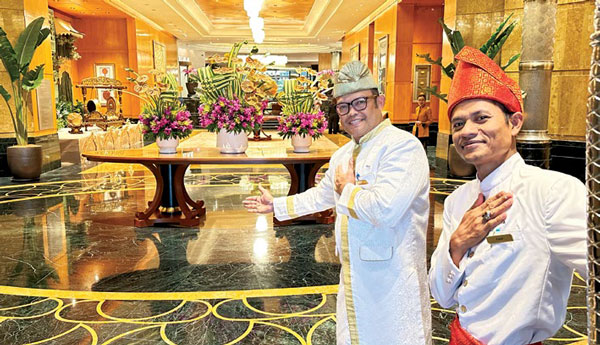
CORPORATE SOCIAL RESPONSIBILITY (CSR)
KLCCP Stapled Group fully embraces the concept of CSR which provides us our social license to operate. Serving the communities we operate in is an extension of creating a positive social impact as part of our ESG commitments. Focusing on community well-being, environment and education as our main social impact aspiration, we continuously enhance our CSR initiatives and explore long-term endeavours that provide ongoing benefits to the communities involved.
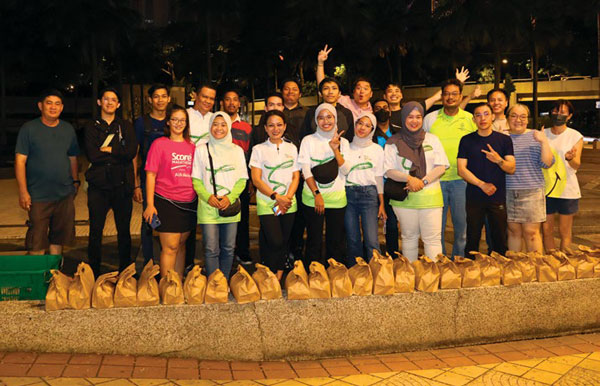
Fostering a culture of volunteering
We aim to instil a strong sense of community among our employees by encouraging a culture of giving through volunteering. Our volunteer programmes focus on activities that address key community needs while promoting sustainability and social well-being. These include providing food aid to underserved communities, participating in environmental conservation efforts like maintaining public spaces or wildlife habitats, and supporting educational initiatives such as recycling programmes in schools.
Through these efforts, we empower our employees to contribute their time and skills to meaningful causes, fostering a shared sense of purpose and community impact.
Contribution to Common Infrastructure Maintenance
As part of KLCCP Stapled Group’s commitment to community investment, we actively support the upkeep of a diverse range of public infrastructure that enhances the functionality and accessibility of our shared spaces. These contributions, either self-funded or pooled in collaboration with other entities managing the common estate and facilities, reflect our dedication to sustainable urban development and community well-being.
Key infrastructure under our care includes iconic spaces such as KLCC Park, the Esplanade, forecourts, vehicular ramps and tunnels, as well as pedestrian walkways and tunnels, which form critical links within the city.
Our investment delivers measurable impacts, particularly in:
- Enhancing pedestrian safety, health and comfort, ensuring the infrastructure remains conducive for public use.
- Driving indirect economic benefits by fostering connectivity and maintaining an environment that supports vibrant urban activities.
While the contributions encompass all infrastructure under our maintenance initiative, beneficiaries are accounted for specifically in areas where tangible metrics, such as pedestrian footfall, can be tracked effectively. This approach ensures transparency and accountability while minimising unnecessary costs in data collection.
KLCC Sustainable September
KLCCP Stapled Group continued to be actively involved in the KLCC Sustainable September 2024, the 2nd rendition of the month-long event dedicated to various ESG-related programmes. Bringing together all our business segments, we presented a united front in engaging communities and fostering sustainable practices. We will continue to organise the event annually, underscoring our relentless pursuit of contributing to a more sustainable planet and society. Refer to pages 164 to 165 of IR for the detailed section related to KLCC Sustainable September.
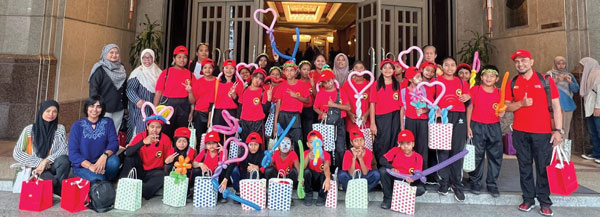
Our Impact
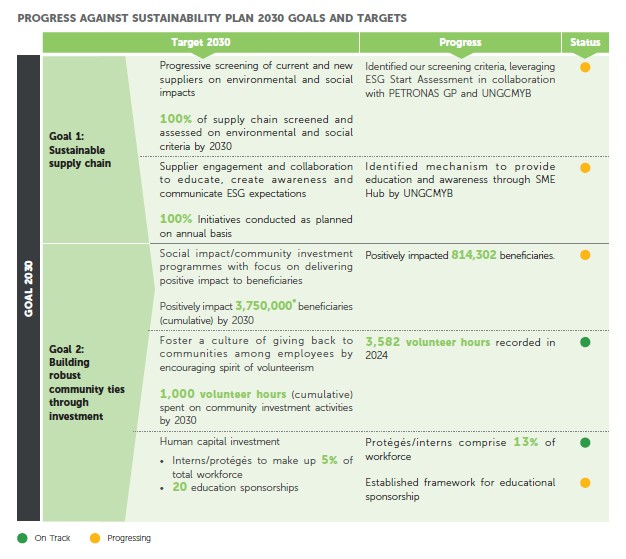
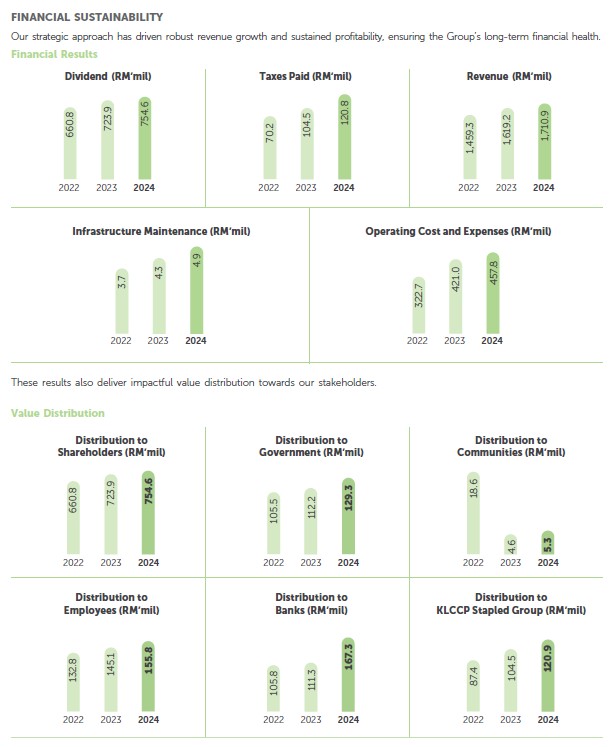
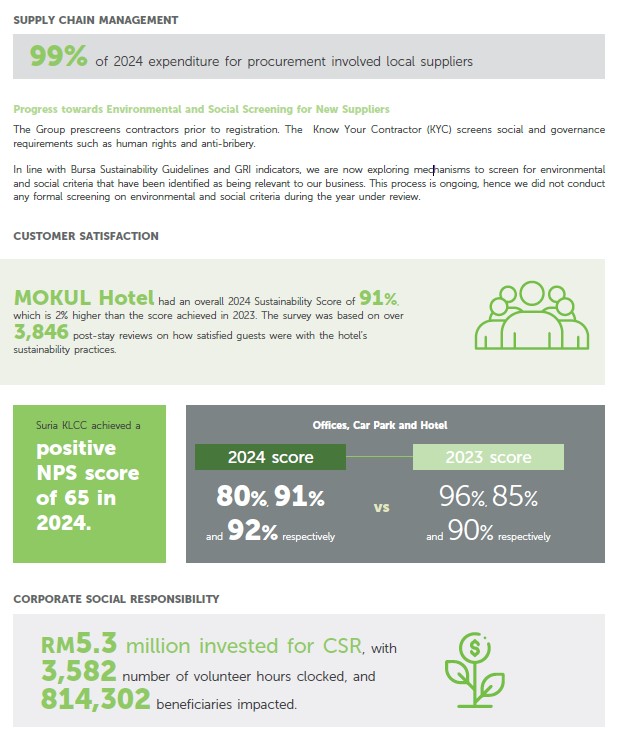
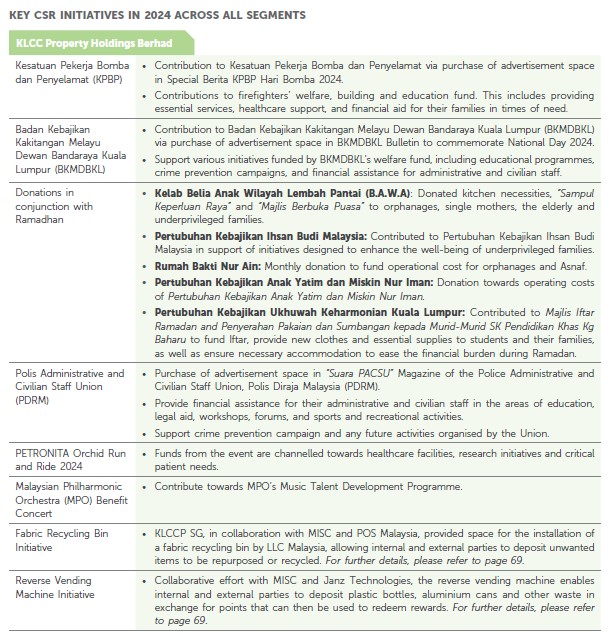
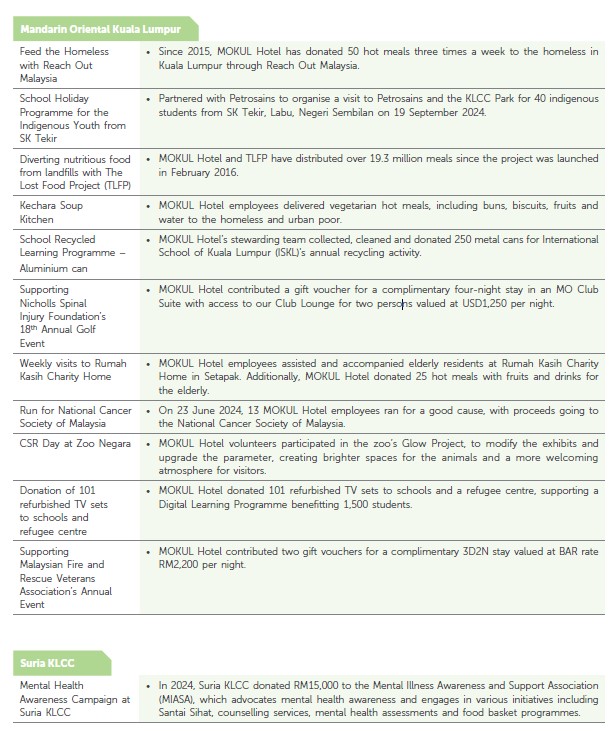
Our Outlook
Looking ahead, KLCCP Stapled Group remains focused on driving sustainable growth through a series of strategic initiatives. We will diversify our portfolio and explore new opportunities to ensure steady revenue growth, while enhancing profitability through improved operational efficiency and cost management. Our commitment to sustainability will be reflected in increased investments in sustainable projects, ensuring our assets remain competitive and environmentally responsible.
We will continue to strengthen our ESG commitment by engaging with stakeholders and integrating responsible practices across the business. As part of our Sustainability Plan 2030, we are focusing on building the ESG capabilities of our supply chain. This includes screening new and existing suppliers on environmental and social aspects, alongside collaborative programmes to raise awareness and align partners with our ESG expectations. Digital platforms will support this process in collaboration with PETRONAS, UNGCMYB and Bursa Malaysia starting in 2025.
We are also dedicated to enhancing customer satisfaction and fostering deeper relationships with our tenants, leveraging innovation to exceed their expectations while promoting sustainability. Our corporate social responsibility efforts will focus on long-term community impact, particularly in education, environmental conservation and employee volunteerism. We will continue to invest in shared infrastructure that supports urban connectivity and safety, while maintaining the momentum of our annual KLCC Sustainable September initiative.
We are committed to continuous improvement and reinforcing our role as a responsible corporate citizen.
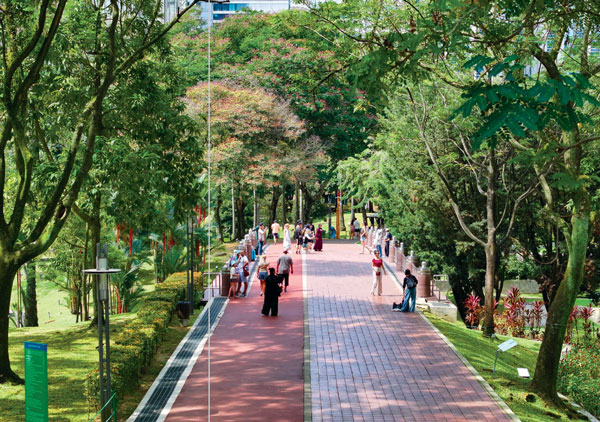
People
Material Sustainability Matters:
Human Capital Development
Human Rights
Labour Standard and Practices
Health, Safety and Security

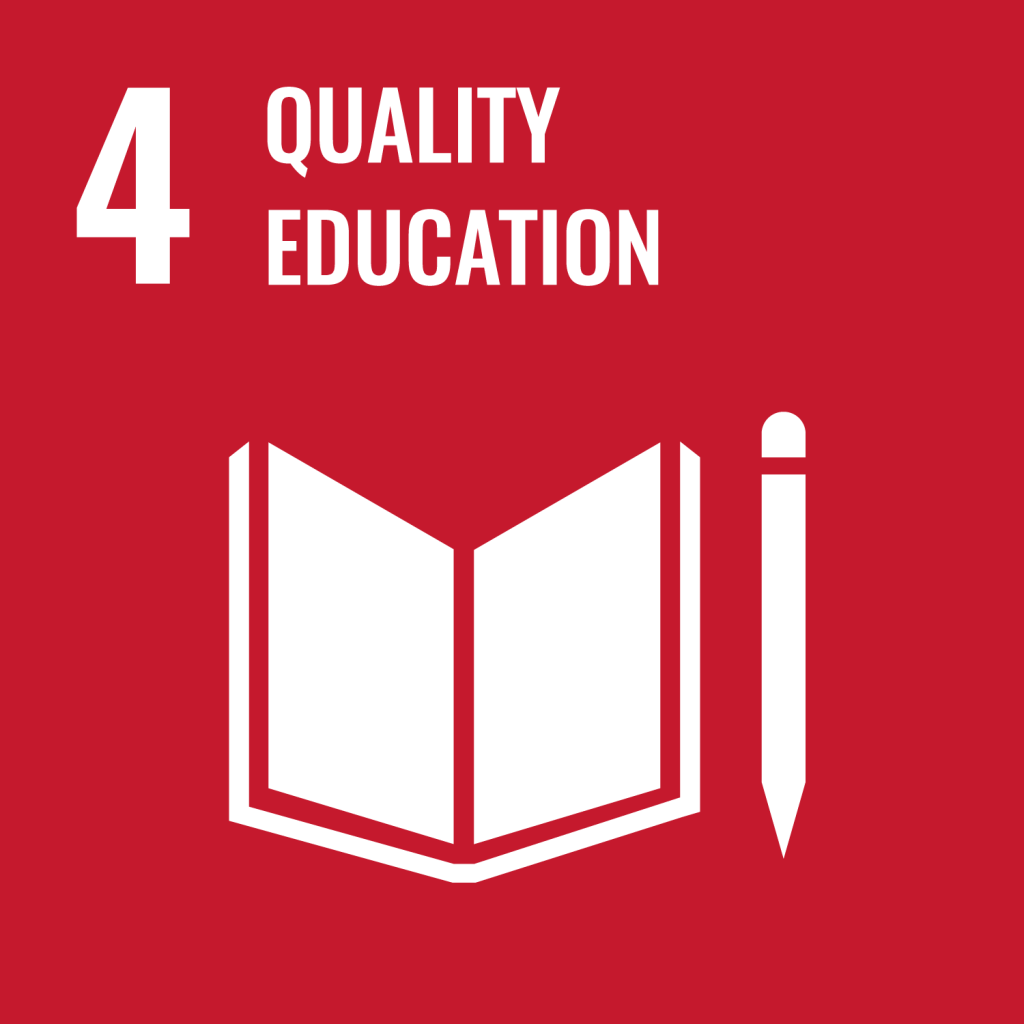
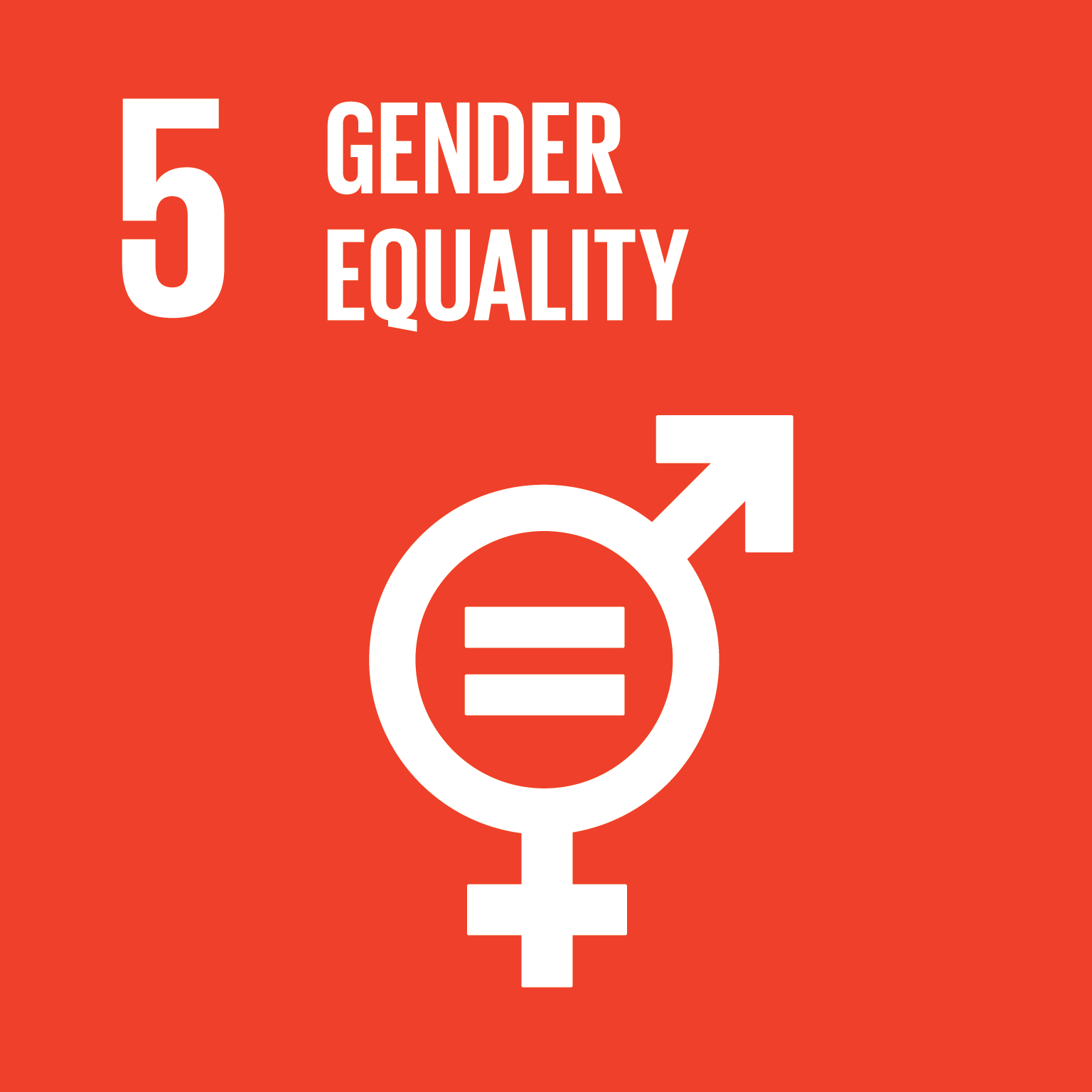

Positive Social Impact
Advancing human rights, workforce sustainability, fostering inclusivity, and enhancing well-being to create lasting social value.Our Commitment
At KLCCP Stapled Group, our people are our greatest asset and the cornerstone of our sustained growth. We are committed to developing a skilled and resilient workforce through continuous learning, engagement and well-being initiatives, ensuring they are prepared to meet evolving challenges.
We uphold human rights and robust labour standards, fostering an inclusive workplace built on fairness, dignity and respect. By creating equitable opportunities and supporting long-term career growth, we cultivate a positive and supportive environment.
Health, safety and security are integral to our sustainability journey. We prioritise stakeholder well-being through innovative solutions and industry-leading practices, safeguarding our people, operations and communities.
These efforts reflect our dedication to empowering individuals, fostering diversity and building a sustainable future together.
Our Approach
We empower our talented workforce to drive sustainable growth by prioritising diverse growth strategies. We ensure they possess the necessary skills and capabilities to fulfil their aspirations while meeting stakeholder needs and adapting to the dynamic business landscape.
LEARNING AND DEVELOPMENT
KLCCP Stapled Group nurtures a culture of self-directed learning, enabling our workforce to acquire essential skills efficiently. Leveraging cutting-edge platforms including MyLearningX (MLX), LinkedIn Learning (LIL) and UNGC Academy, we optimise employees’ time and commitment to current tasks while allowing them to pursue their learning and developmental needs for growth. We aspire to attain best-inclass learning and development standards targeting an average of 80 learning hours per employee per annum as part of our Sustainability Plan 2030.
We also maximise the development of workforce through coaching and mentoring, tapping into the years of expertise present within the organisation, through the Leaders Develop Leaders (LDL) and Leader’s Network programme. Both programmes provide a structured and systematic approach for experienced leaders to converse, coach and facilitate others by inspiring and creating presence while developing themselves. Other mechanisms utilised for leadership development include Foundational Leadership (Executives), Dynamic Leadership (Managers) and High Impact Leadership (Senior Managers), each covering a specific employee level within the organisation.
ESG SPECIFIC LEARNING AND DEVELOPMENT
KLCCP Stapled Group established an ESG training plan in 2024, which tailors learning programmes according to the needs of the specific ESG functions. This is done through a needs identification and analysis process which allows us to determine the knowledge necessary for critical positions such as SSC members, GHG focal persons and sustainability network agents. The training plan provides a systematic approach in providing both self-learning and classroom-based learning that suits current trends and agenda for these critical positions. For the general workforce, ESG learning and development focuses on more high-level awareness. ESG awareness is also enhanced using communication platforms. These include, the Do You Know (DYK) Campaign, which is a bulletin to share up to date ESG information and knowledge as well as Friyay Sessions, a learning and development programme carried
WORKFORCE SUSTAINABILITY AND CAPABILITIES BUILDING
The Group prioritises sustaining a high-performing, adaptable workforce equipped with the skills and competencies necessary for organisational success. We invest in continuous development, talent mobility, and strategic initiatives to ensure our workforce remains resilient and capable across business functions.
Talent Development & Mobility: Together with the employees, we co-created Success Profile for Unique Roles (SPUR) for all positions. This initiative empowers employees by clarifying job requirements and the competencies they need to acquire and demonstrate, motivating them to drive their career growth within a dynamic Career MarketPlace. The implementation of the Superior Managed Assessment on Leadership Competencies (EDGE) and the Core Capability Assessment on employees’ technical and functional skills provides continuous guidance on competency improvement. It also serves as the basis for a personal development plan towards achieving individual career aspirations within the company. We have also been proactive in identifying employees who have met progression criteria to be promoted, or on job-rotation, resulting from the implementation of their personal development plans.
Succession Planning and Leadership Development: To ensure leadership continuity, we proactively identify highpotential talent and regularly conduct talent reviews. Personal development plans support long-term leadership growth, while structured succession planning addresses critical role needs, particularly in advance of leadership retirement.
Employee Performance Management (EPM): Our EPM framework aligns individual performance with company goals, fostering a culture of accountability, continuous improvement and engagement. It includes structured goal setting, ongoing feedback and performance evaluations, enabling employees to reach their full potential and contribute to organisational success.
Recruitment Drive: To build a strong talent pipeline, the Group participates in career fairs, engages in campus recruitment, and collaborates with universities and job portals. These efforts expand our reach and attract top-tier candidates for both fresh graduates and experienced professionals.
Remuneration Competitiveness: We regularly benchmark our compensation packages to ensure they remain competitive within the industry. This helps us attract and retain skilled professionals, addressing challenges posed by talent competition from other sectors.
Internal Mobility and Career Progression: Our structured approach to talent mobility and employee progression provides opportunities for career growth across different functions, supporting skills diversification and enhancing overall organisational capability.
WORKFORCE ENGAGEMENT AND WELL-BEING
We prioritise the well-being of our employees by evolving the workplace into a more dynamic, inclusive and supportive environment. Various programmes are executed in all business segments to sustain a high level of workforce engagement and well-being across the Group.
The KLCC Sports and Recreation Club (KSRC) plays an important role in supporting the well-being of employees, offering expanded activities and wellness programmes that promote holistic work-life integration. Key activities include After-work Programmes, Fitness Programmes, Life-saving Courses, Putrajaya Core Island Expedition and sports events, all of which encourage physical fitness and social interaction among employees.
The Employee Assistance Platform (EAP) provides personalised wellness insights, allowing employees to take charge of their health and lifestyle. Key features include wellness webinars and mental and emotional support.
We continue to facilitate the PETRONAS Organisation Climate Survey (POCS), a comprehensive annual initiative designed to evaluate and enhance PETRONAS’ organisational culture. POCS demonstrates the Group’s commitment to creating a more inclusive, engaging and supportive work environment for all employees, in line with Goal 3 under the People pillar within our Sustainability Plan 2030.
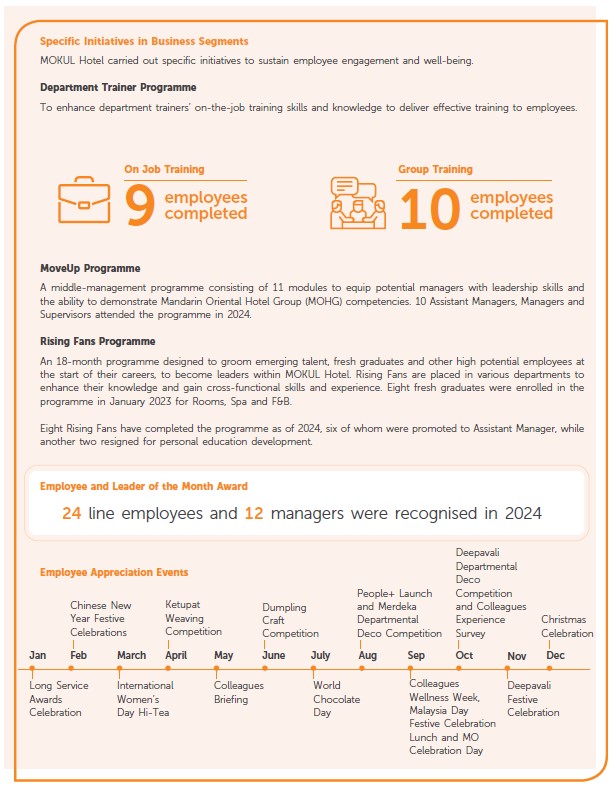
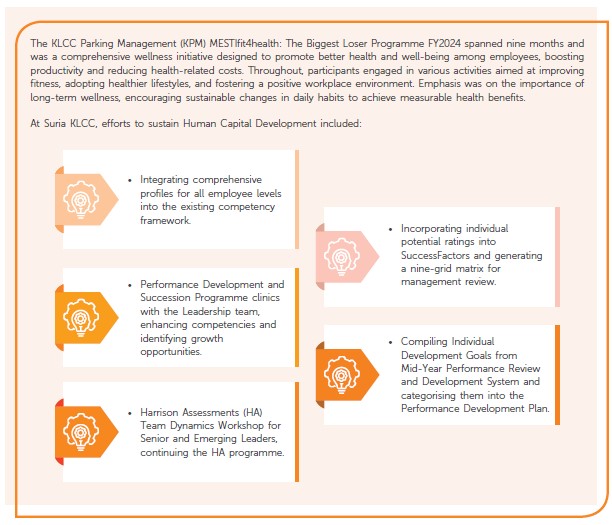
EQUALITY, DIVERSITY, AND INCLUSION
We are committed to maintaining a workplace that reflects the rich diversity of our society. Through strategic recruitment and training initiatives, we nurture a workforce inclusive of various ethnicities and age groups with a good gender mix. By ensuring fair gender pay and balanced demographic representation, we create an environment that supports talent retention and robust succession planning.
Our goal is to foster a culture where every employee, regardless of their background, can thrive based on merit and performance. We uphold the principle of non-discrimination at every level across our operations.
NON-DISCRIMINATION
We believe in treating everyone equitably and with respect. By embracing individual differences, we cultivate a workplace where diverse perspectives are not only welcomed but valued. This commitment is enshrined in our Code of Conduct and Business Ethics (CoBE), which serves as a guiding framework for all employees.
To address any breaches of CoBE, we provide a robust and confidential grievance mechanism, empowering employees to report concerns safely. Our Human Capital Department ensures swift and fair resolution of grievances, reinforcing our commitment to fairness and equality at work.
KLCCP Stapled Group is steadfast in our dedication to upholding fundamental human rights for everyone connected to our business. We are unequivocally opposed to forced labour, child labour, modern slavery and any unfair practice across our operations.
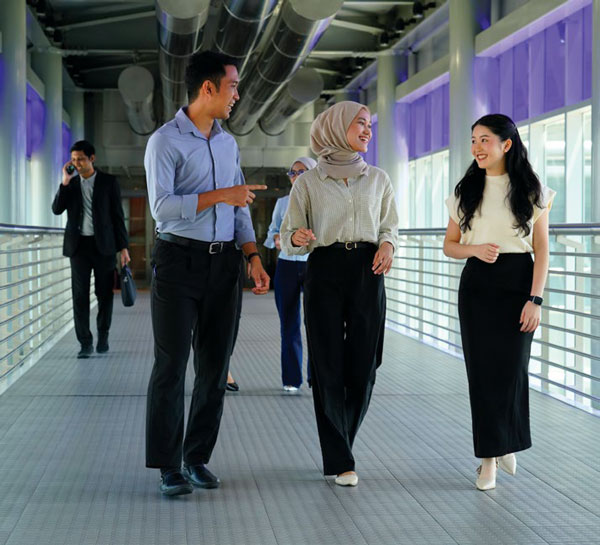
HUMAN RIGHTS POLICY
In 2024, the Group took a significant step forward by introducing our own Human Rights Policy, underscoring a commitment to human dignity, equality and justice within our operations and across our supply chain.
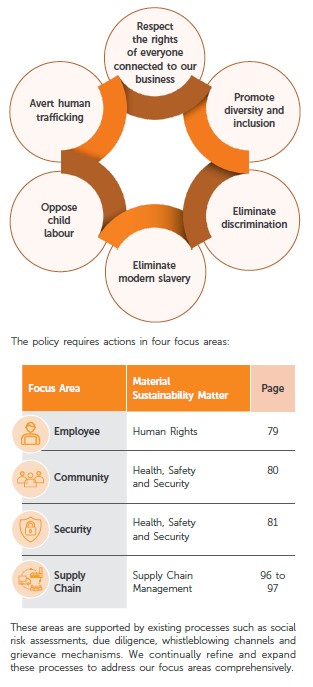
GRIEVANCE MECHANISM FOR HUMAN RIGHTS ISSUES
KLCCP Stapled Group has in place a formal grievance mechanism for employees to report any perceived human rights violation. All reports are treated with the utmost confidentiality, thoroughly investigated, and resolved promptly if substantiated. This mechanism is a cornerstone of efforts to protect and empower our workforce, ensuring issues are addressed before they can escalate.
By embedding these principles into our daily operations, KLCCP Stapled Group fosters a fair, safe and inclusive environment for all. We continue to refine our practices to meet the highest standards of human rights, creating value not just for our stakeholders but for society at large.
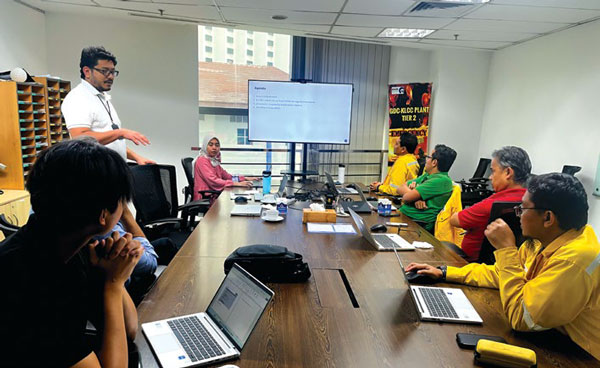
STRENGTHENING HUMAN RIGHTS PRACTICES THROUGH SOCIAL RISK MANAGEMENT
This year, we concluded our three-year social performance strategy, further strengthening our commitment to human rights by deepening our understanding of key social risks across our value chain, including our employees, contractors and the communities we impact. We have also improved our employees’ knowledge and awareness of human rights, while enhancing our human rights compliance and enforcement.
Leveraging insights from previous Social Risk Assessments (SRAs), we conducted a series of training sessions to introduce participants to critical human rights legislation and best practices. These sessions are essential to fostering a culture of respect for human rights within our operations and throughout our value chain.
Additionally, we have made significant strides in improving the SRA Technical Standard by expanding the scope of the assessment to include indigenous people, cultural heritage, land acquisition and involuntary resettlement. This not only enhances the coverage, quality and consistency of our assessments but also ensures alignment with international best practices and evolving regulatory requirements.
HEALTH AND SAFETY MANAGEMENT
At the heart of our approach is a robust self-regulated HSE Management System that covers all employees and outsourced workers under the Group. Fortified by an HSE Policy encompassing our commitment to the highest performance standards, the Group ensures all our business functions and operations are conducted without any harm to internal or external parties.
Both our HSE Management System and Mandatory Control Framework (MCF) are assessed by internal and external parties to ensure the processes meet the requirements of standards subscribed to. Our ISO 45001:2018 certification serves as recognition that the HSE Management System implemented in KLCCUH, KPM and MOKUL Hotel meets international standards. The external assurance conducted in 2024 resulted in two nonconformance reports (NCRs) and five opportunities for improvement (OFIs). These are being addressed as we leverage opportunities to improve the management system further.
We achieved zero non-compliance with all relevant laws and regulations, reflecting a high level of health and safety performance benchmarked against industry best practices.
PROACTIVE HAZARDS, RISKS AND INCIDENT MANAGEMENT
Incident management forms a critical part of the HSE Management System and MCF. Key processes are in place to ensure H&S-related hazards and risks that may arise from operational activities are managed and controlled in accordance with the hierarchy of control, through the Hazards and Effects Management Process (HEMP).
The Unsafe Act Unsafe Condition (UAUC) process is another proactive effort undertaken whereby employees report potential hazards or risks identified without fear of reprisal. Should an incident occur, response procedures are executed to minimise the impact. These are followed by investigations into the root causes and necessary actions to prevent any recurrence.
In 2024, a total of 7.74 million manhours were recorded, of which 57% or 4.43 million manhours originated from contractors. Of the remaining 43% or 3.30 million manhours accounted for by our employees, most were in the hotel and retail segments. Testifying to our commitment to H&S, the Group successfully maintained zero fatalities within our business operations this year, despite the increase in manhours.
We also recorded four Lost Time Injury (LTI) cases during the year, leading to a frequency rate of 0.52. Nevertheless, actions and interventions to maintain a safe workplace are constantly identified and implemented, with a focus on improving our overall HSE Culture.
GENERATIVE HSE CULTURE
KLCCP Stapled Group acknowledges the importance of a strong HSE Culture, which can only be amplified in terms of maturity by instilling personal accountability at all levels. Efforts to enhance such a culture have resulted in increased awareness and understanding of HSE principles among all employees as well as improved leadership effectiveness in driving more initiatives.
In 2024, the Group achieved a rating of 4.19 on the Generative Culture Ladder with a response rate of 97% in the Culture Maturity Survey across KLCCP. This reflects our dedication to maintaining exceptional HSE practices across our operations. We adhere strictly to HSE standards, cultivating a culture of compliance and leadership among our employees and contractors, reinforcing our position as a sound investment choice.
The HSE training programmes organised in 2024 were pivotal to this achievement. The number of employees and workers trained continued to grow over the years, demonstrating conscientious efforts to inculcate the Generative HSE Culture we desire.
DIGITALISING HSE
KLCCP Stapled Group has increasingly digitalised our HSE solutions including performance and incident reporting, improving our reporting process cycle efficiency and datadriven decision-making. Internally, we have developed an HSE Performance Reporting Platform, HPRP, for reporting HSE performance, incidents and legal non-compliance. We also report necessary data on HSE performance and incidents to PETRONAS through their HSSE MARS and HSSE IM platform. All data is consolidated in a centralised database and visualised via a Power BI dashboard, enabling trend monitoring and Key Performance Indicator (KPI)/Balanced Scorecard (BSC) setting.
The solutions implemented not only optimise operational efficiencies by streamlining HSE reporting and management processes, but also enhance our capacity to discern valuable trends and patterns in HSE performance. As a result, we have solidified our reputation as a leader in technology-driven HSE management.
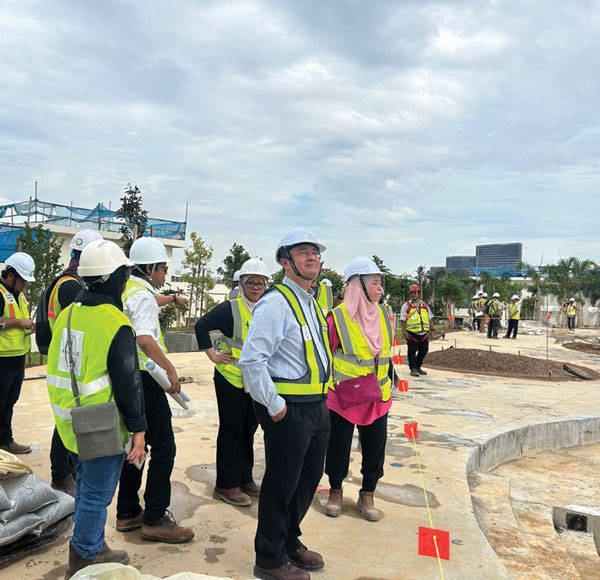
CORPORATE SECURITY
Ensuring a robust security and surveillance system is vital to safeguarding the iconic PETRONAS Twin Towers and the entire KLCC Precinct, while providing seamless access for visitors and effectively managing security incidents affecting nearby structures. The KLCC Precinct Security Management Centre (KPSMC), equipped with advanced digital technology, serves as a central command for monitoring security across the KLCC Precinct, strengthening our updated security strategy. This year, we conducted eight security training sessions, which included elements of human rights, with full participation and attendance by all security personnel.
In 2024, as in previous years, there were no major security breaches across any of the KLCCP Stapled Group assets or operations.
Additionally, our adherence to the KLCC Security Management System (SeMS) for KLCCUH reflects an ongoing commitment to maintaining a security management system that aligns with international best practices.
Our Impact
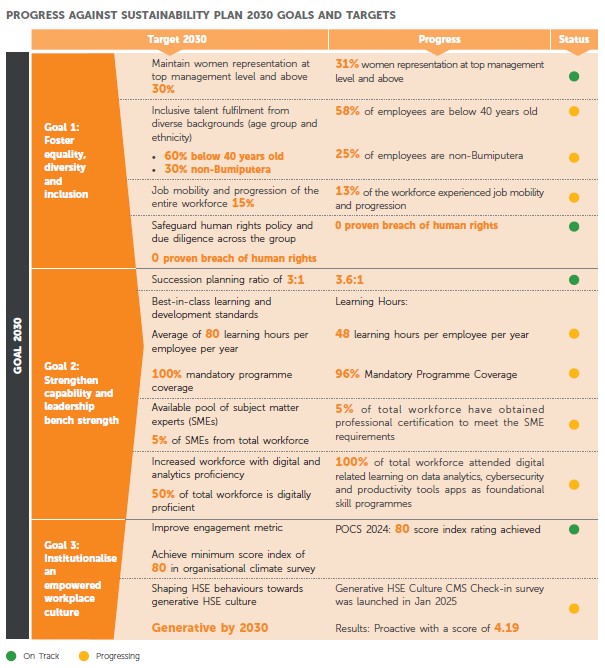
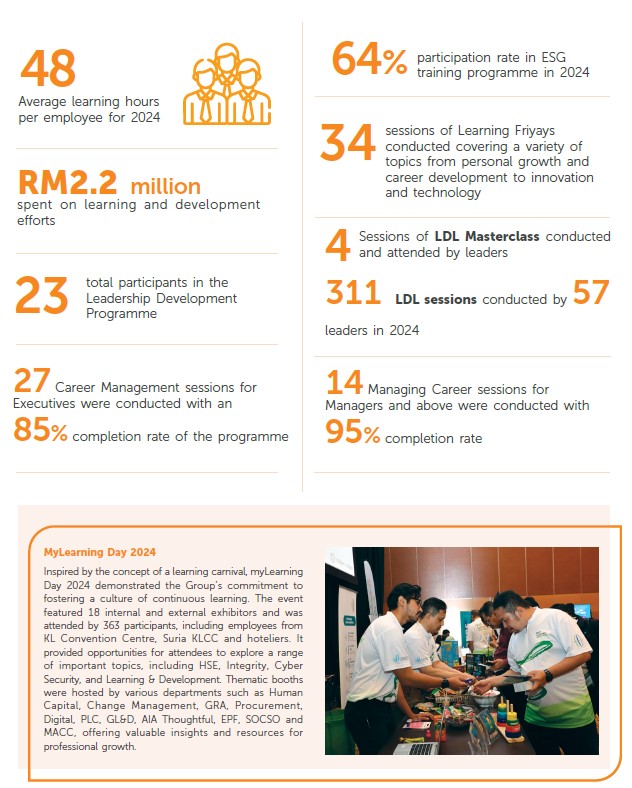
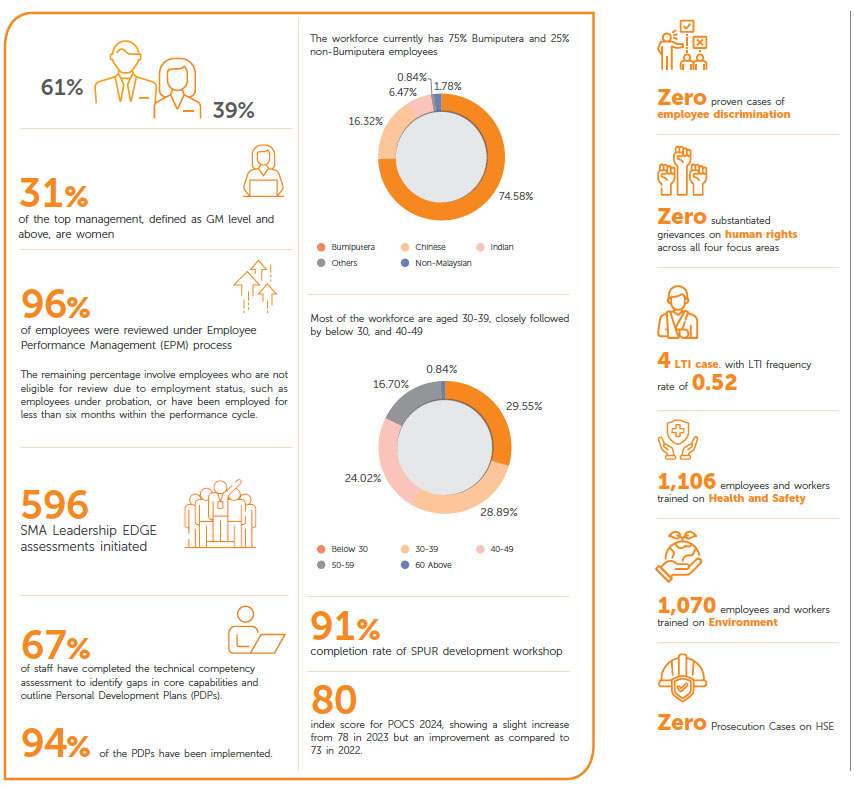
Our Outlook
At KLCCP Stapled Group, we aim to build a skilled, inclusive and resilient workforce by enhancing leadership, technical expertise and digital capabilities. Through wellness programmes and engagement, we ensure a high-performing workforce that drives both business growth and societal impact.
We are committed to strengthening human rights practices, embedding these across our operations and value chain. By promoting fairness, equity and inclusion, we aim to create a workplace where every employee feels valued and empowered.
To attract and retain top talent, as well as high performance, we will refine our recruitment, remuneration and succession planning strategies, providing clear career pathways and nurturing future leaders. Our focus remains on reducing turnover and fostering internal mobility to build a stable workforce.
Health, safety and security remain at the core of our sustainability efforts. Through technology, proactive risk management and continuous improvement, we will maintain a safe and secure environment for all stakeholders.
These initiatives reflect our commitment to empowering people and ensuring longterm success for the organisation and the communities we serve.
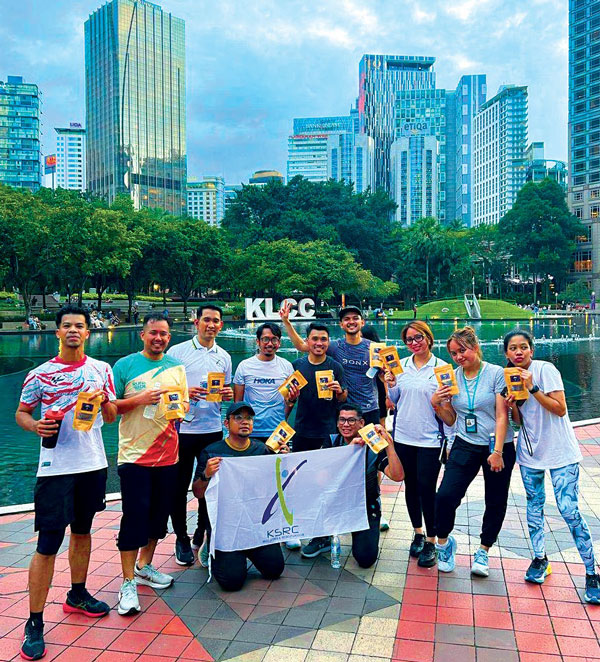
Peace
Material Sustainability Matters:
Corporate Governance
Business Ethics
Cyber Security and Data Privacy

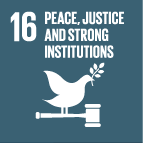
Responsible Governance
Strengthening corporate governance, upholding business ethics, and prioritising cyber security and data privacy to foster accountability, transparency, and trust.Our Commitment
At KLCCP Stapled Group, we are committed to upholding strong corporate governance, which is fundamental to maintaining transparency, accountability and ethical conduct across our operations. We recognise that strong business ethics is key to ensuring resilience and longterm value, fostering stakeholder trust and contributing to sustainable growth. Our approach incorporates transparent communication, proactive risk management, and embedding responsible business practices at every level, thereby safeguarding stakeholder interests and promoting business prosperity.
We also understand the importance of safeguarding our systems and data to maintain operational continuity. Our commitment to cyber security and data privacy ensures that we meet the highest standards of security, protecting our information and building trust with our stakeholders. Through these efforts, we aim to strengthen our position as a responsible and resilient organisation in an ever-evolving business landscape.
Our Approach
BOARD DIVERSITY AND CAPACITY
A diverse Board is imperative to respond to the complexities and interconnectedness of challenges facing businesses today. To ensure a balanced mix of expertise and skillsets, the Boards are committed to preserving diversity across backgrounds, age, gender and ethnicity on top of experience and perspectives. This diversity facilitates the Boards in navigating the sustainability landscape encompassing environmental, social and governance dimensions. Inclusivity in decision-making enhances creativity, innovation and risk management, ultimately leading to more robust and sustainable business practices.
The Board Diversity Policy, approved by KLCCP Board and applicable to KLCCRM, reflects the government’s aspiration for women to represent at least 30% of boards of directors. The Boards have been exceeding this minimum since 2020, with women making up 50% of our Directors for the year under review.
The Boards have also implemented a nine-year term limit for Independent Directors, as recommended by the Malaysian Code on Corporate Governance (MCCG). Currently, none of the INEDs on our Boards exceed this ceiling.
Recognising that effective sustainability leadership requires ongoing education, the Directors received targeted training for the year under review. On 28 August 2024, a half-day session was organised on “Global Internal Audit Standard”, providing them with a comprehensive understanding of the new internal audit standards to be implemented in 2025. On 20 November 2024, the Directors attended a Sustainability Deep-Dive session on Scope 3 GHG emissions conducted by PETRONAS Corporate Sustainability Office, providing them understanding on Scope 3 quantification, and the approaches towards maturing Scope 3 emissions accounting.
Additionally, the Directors participated in the Mandatory Onboarding Programme on Sustainability as per Bursa Malaysia’s Listing Requirements which was designed to enhance their capability to address sustainability considerations effectively.
ESG OVERSIGHT
The Boards review quarterly updates on ESG progress against the KLCCP Stapled Group’s Sustainability Plan 2030 targets to ensure they remain appropriate and in the best interest of the Group’s stakeholders. The Boards also deliberate on the impact of ESG on the Group’s strategy and long-term success, including significant investment decisions.
ENTERPRISE RISK MANAGEMENT
An effective and sound risk management system is important to achieve the Group’s business strategies and objectives. We leverage on the KLCC Group Enterprise Risk Management (ERM) Framework which sets out the governing elements and processes as the foundation of ERM practices to assess, treat, monitor and review risk. The ERM Framework ensures a common understanding of risk management and a consistent approach in managing the Group’s risks.
KLCCP Stapled Group is committed to providing a reasonable level of confidence that risks and their associated controls are adequately, effectively and safely managed through a comprehensive assurance programme.
To support the above, there is an established Risk Management Oversight Structure encompassing the KLCCP and KLCCRM Boards, Board Risk Committees (BRCs), and the Risk Management Committee (RMC). This structure assigns responsibility for risk management while facilitating the assessment and communication of risk-related matters from the operational levels to the Boards. The overall strategy for managing risk is as per the KLCC Resiliency Model which focuses on three areas of business resilience namely ERM, Crisis Management (CM) and Business Continuity Management (BCM).
Enterprise Risk Management
ERM is a structured and holistic approach to evaluate and manage the uncertainties an organisation faces. To become a risk-resilient organisation, KLCCP Stapled Group strives to implement risk management best practices that protect and create value within set boundaries, including risk-based decision-making by providing a balanced and holistic view of exposures to achieve business objectives.
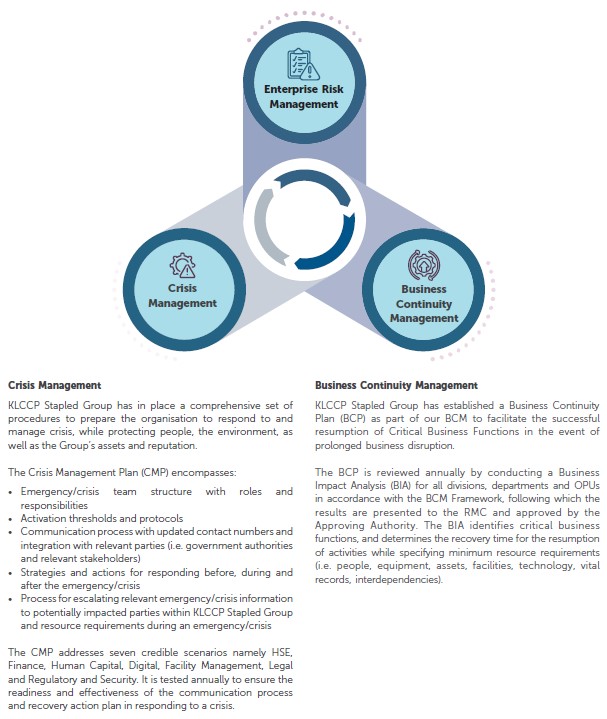
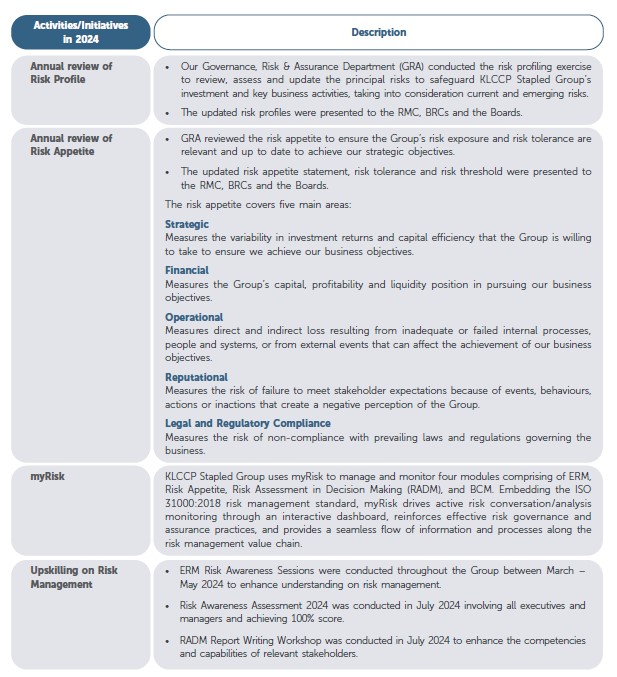
INTEGRITY AND CORRUPTION MANAGEMENT
KLCCP Stapled Group’s continuous efforts to manage our integrity risk reflect a commitment to conducting business with integrity in support of the Group’s zero tolerance against all forms of bribery and corruption.
We recognise that bribery and corruption pose a constant threat to our operations, with risks varying across different landscapes including jurisdictions, business sectors, people and transactions. To manage these risks, we adhere to the Code of Conduct and Business Ethics (CoBE) which is based on the values of Loyalty, Integrity, Professionalism and Cohesiveness.
TOP LEADERSHIP COMMITMENT
Our Policy Statement on Anti-Bribery and Corruption was established in November 2024. The policy states our commitment to complying with applicable laws and regulations, which include the CoBE and the Anti-Bribery and Corruption (ABC) Manual. Consequence management will be applied on any employee who contravenes the CoBE. Channels to report improper conduct observed within the Group are available for employees and the public.
ANTI-BRIBERY MANAGEMENT SYSTEM
KLCCP Stapled Group and its subsidiaries, KPM and KLCCUH, have been certified with ISO 37001:2016 ABMS standards since 2020. The surveillance audit conducted by SIRIM in November this year showed that our systems and controls are adequate and effective in ensuring compliance with the standard.
We implement Adequate Procedures as per the T.R.U.S.T. Principles based on the Guidelines supported by the MACC Act 2009 (Act 694), i.e. Top Leadership Commitment, Risk Assessment, Undertake Control Measures, Systematic Monitoring, Review and Enforcement, as well as Training and Communication.
We established ‘TRUST-T’, a digital tool that tracks, monitors and automates reminders to entities, to implement the ABMS T.R.U.S.T Action Plan according to planned dates. This is to ensure Adequate Procedures as per T.R.U.S.T Principles are in place enabling ABMS insight across the Group.
ABMS-specific knowledge was enhanced via curated training for a specific target group ensuring effective ABMS understanding and practice.
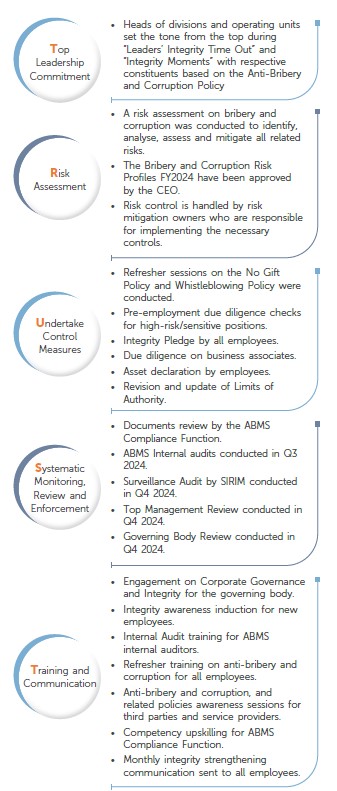
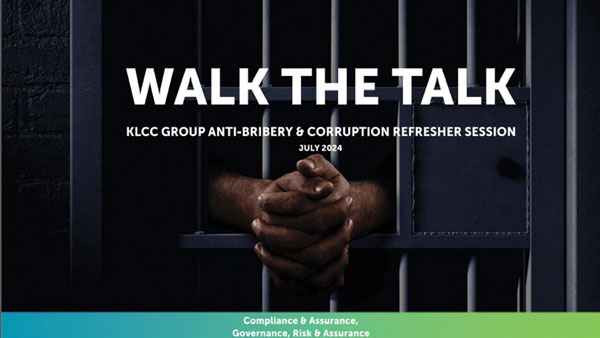
KLCCP Stapled Group’s commitment to enhancing integrity is evident through regular anti-bribery and corruption awareness and refresher sessions provided to all employees. These sessions not only reinforce our stance against corruption but also ensure that everyone is well-versed in our Anti-Bribery and Corruption Policy, Whistleblowing Policy and our exposure under the corporate liability provision of Section 17A of MACC Act 2009.
CYBER SECURITY AND DATA PRIVACY
Our digital infrastructure is a vital asset that must be safeguarded against evolving cyber threats. To this end, the Group has implemented robust cyber security measures aimed at fortifying our systems and preventing unauthorised access. Regular assessments, updates and monitoring protocols are integral to our strategy of identifying and mitigating potential vulnerabilities, ensuring the ongoing integrity of our systems. Efforts to safeguard our digital infrastructure led to zero cyber security incidents across the Group in 2024.
Education and Awareness
We prioritise the continuous education of our employees on Cyber Security through regular training. Each employee in KLCCP underwent 8.33 hours of dedicated learning, while Suria KLCC and MOKUL Hotel recorded, 5.02 and 0.5 hours per employee on average, respectively in 2024, ensuring a well- informed and vigilant workforce.
Phishing Tests
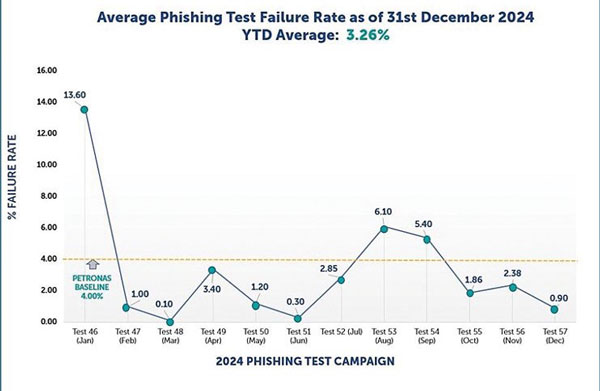
To gauge employees’ awareness, we conduct phishing tests regularly. These simulations help to identify potential vulnerabilities and empower our teams to recognise and respond to phishing attempts effectively.
Enterprise Cyber Security Governance Framework
Our cyber security efforts are guided by the Enterprise Cyber Security Governance Framework. Comprising a comprehensive set of policies, procedures and controls, the framework presents a consistent and standardised approach to cyber security across the Group.
The framework also prioritises the protection of sensitive information shared with external parties. Our Vendor Contract Agreements integrate Non-Disclosure Agreements (NDAs), reinforcing the commitment to data privacy and setting clear expectations for our partners and vendors.
Cyber Security Business Impact Assessment (CS-BIA)
As part of our proactive approach, we conduct regular Cyber Security Business Impact Assessments (CS-BIA) on applications used within the Group. Potential risks are identified and addressed promptly, minimising the likelihood of security incidents.
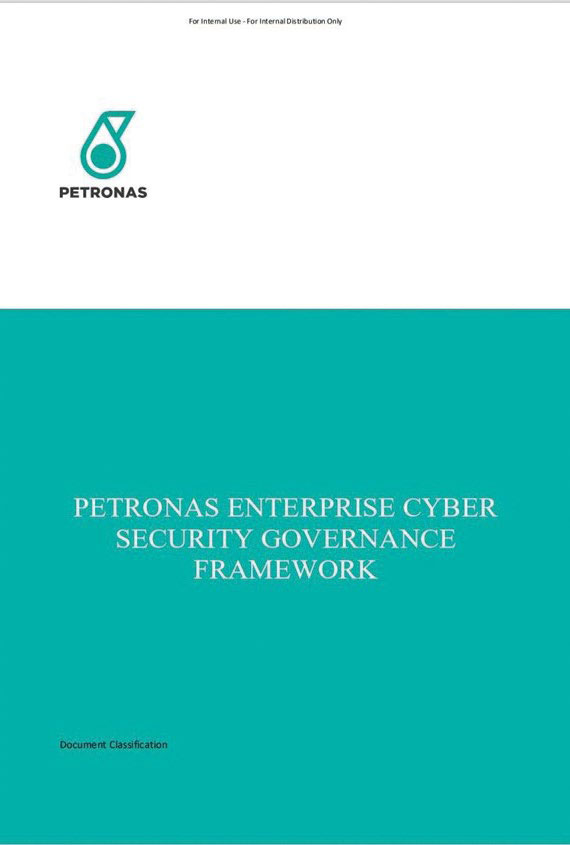
Our Impact
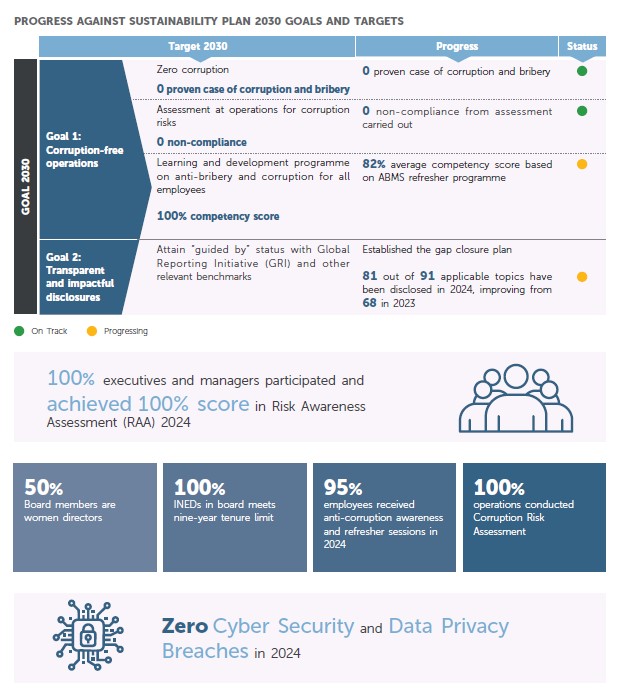
Our Outlook
KLCCP Stapled Group remains dedicated to maintaining the highest standards of governance, integrity and business ethics. We will continue to reinforce our anti-bribery and corruption measures, ensuring compliance with both local and international regulations, while fostering a strong culture of ethical conduct across the Group.
Our efforts to strengthen risk management and crisis preparedness will persist, with tools like myRisk helping us to manage emerging risks and ensuring business continuity. Board diversity and inclusivity will remain key, further enhancing governance and sustainability leadership.
In cyber security and data privacy, we will maintain our commitment to safeguarding sensitive information by continuously improving our digital infrastructure, enhancing threat detection, and refining our risk management strategies to ensure long-term operational resilience.
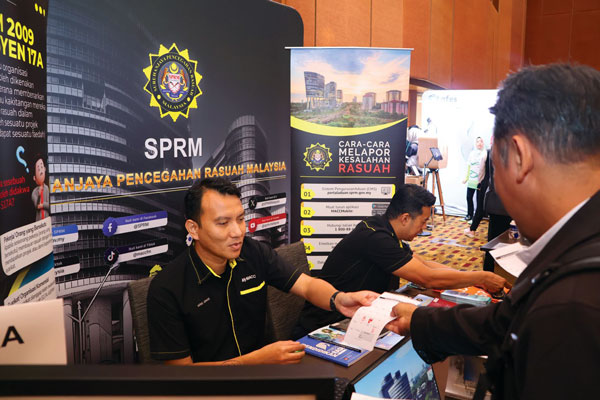
Code of Conduct and Business Ethics (CoBE) | PETRONAS Anti-Bribery & Corruption Manual | Whistleblowing Policy | PETRONAS Whistleblowing Channel | Policy Statement on Anti-Bribery & Corruption | Board Diversity Policy | Board Composition | KLCCP Board Charter | Remuneration Framework | Directors' Fit & Proper Policy |
